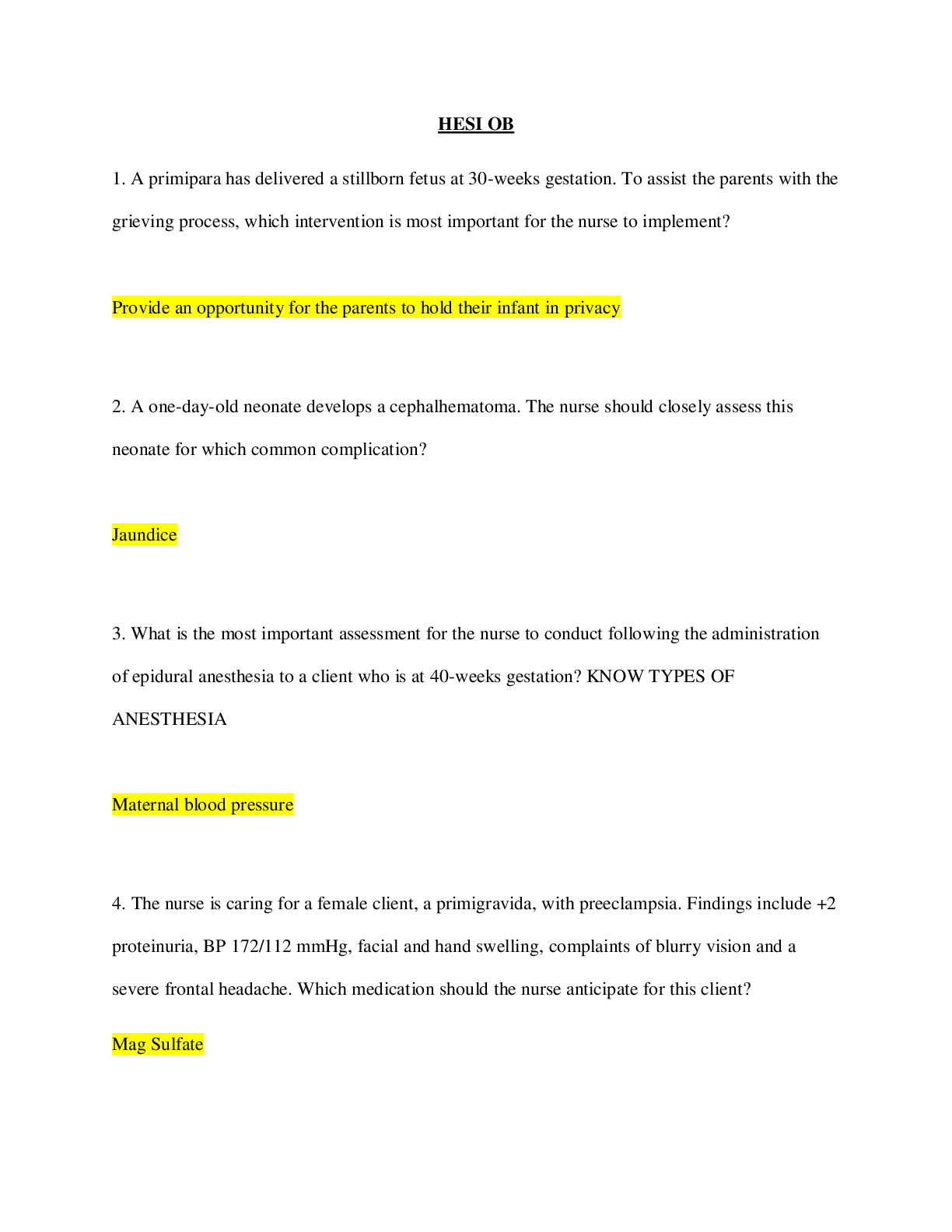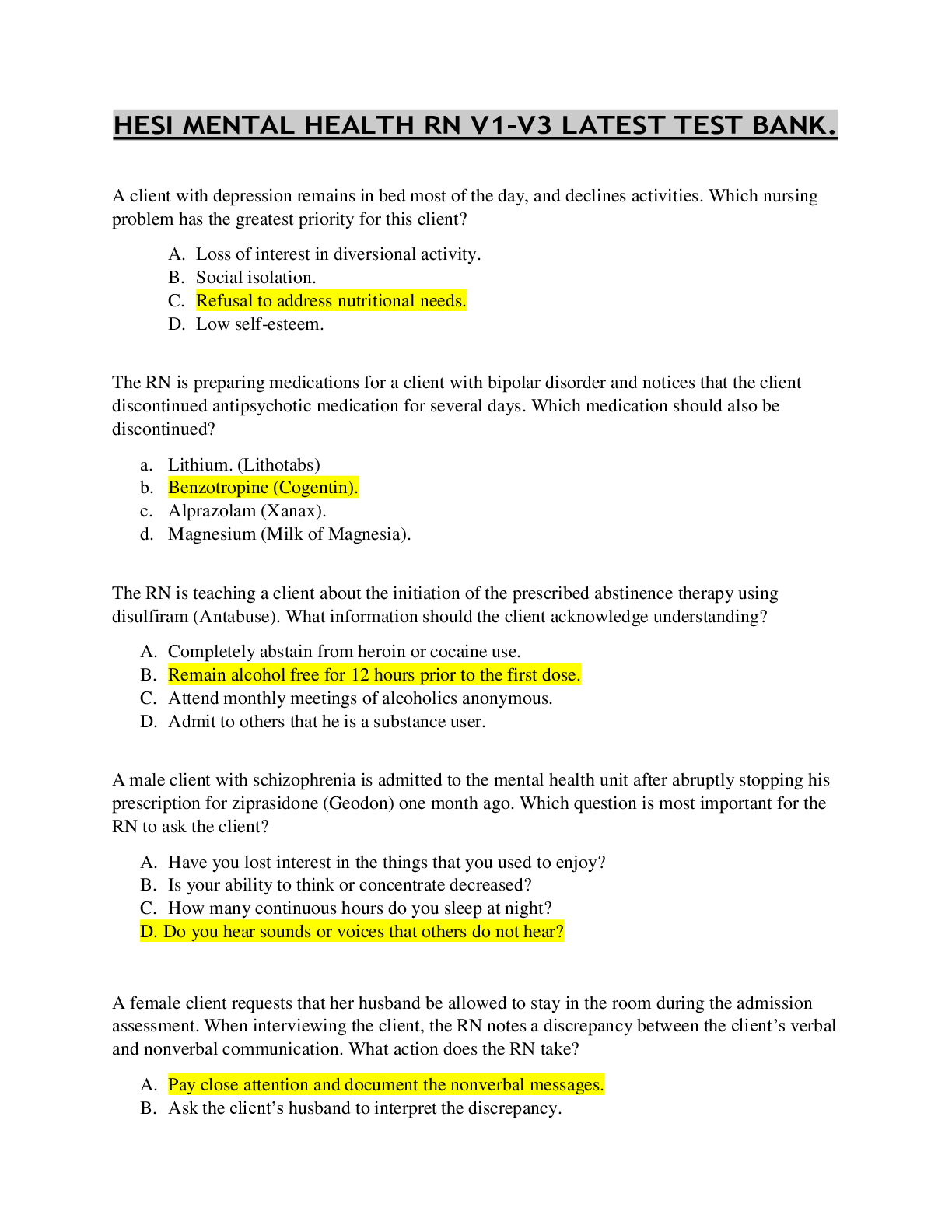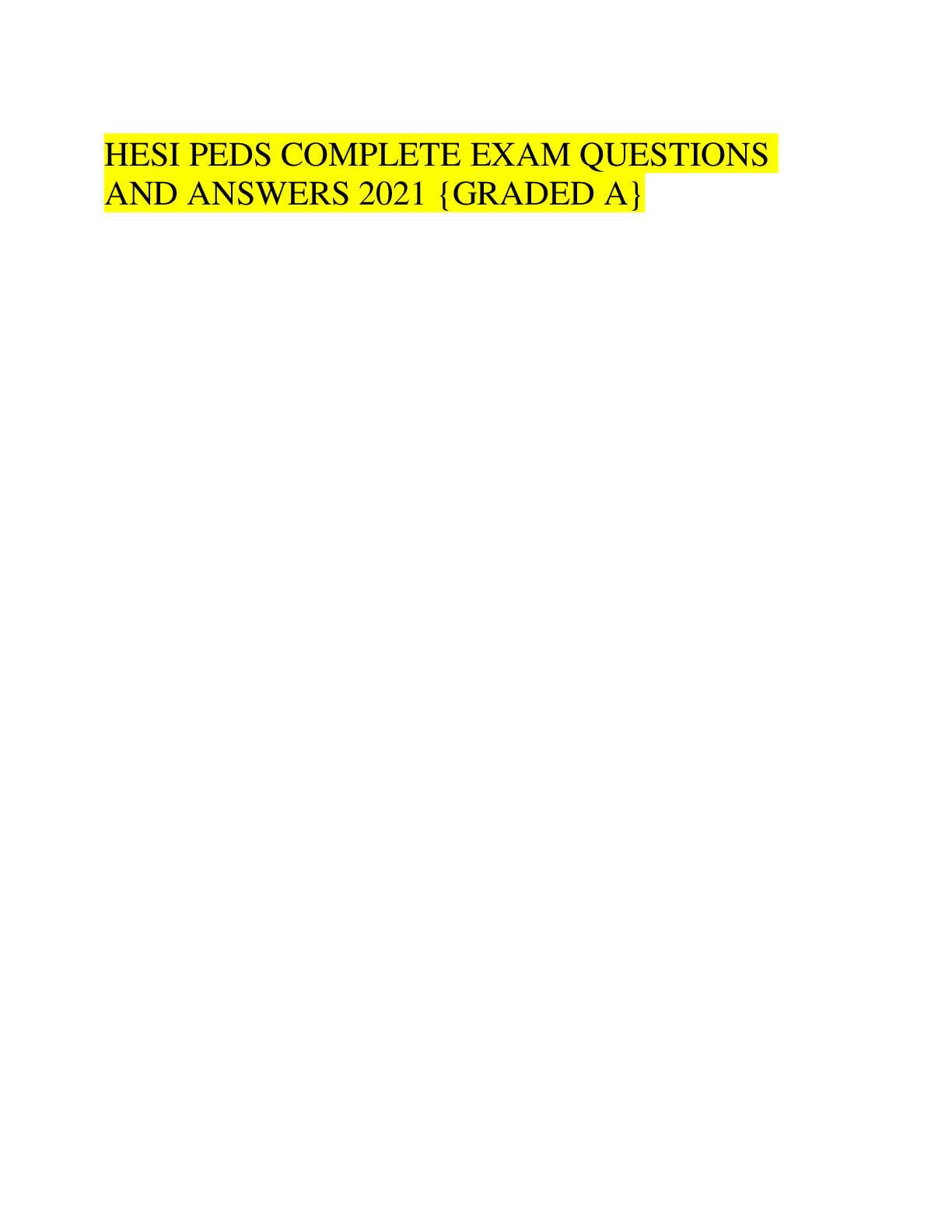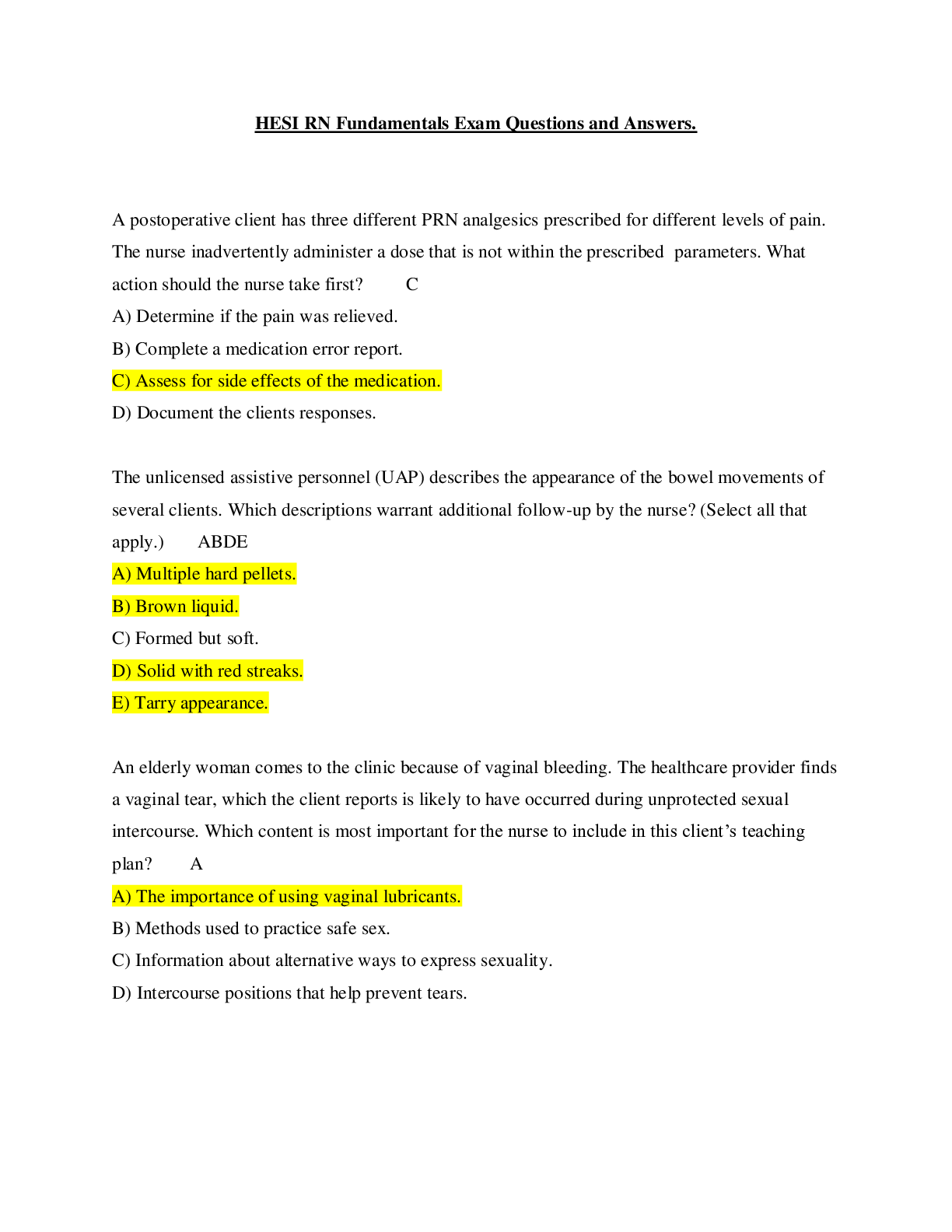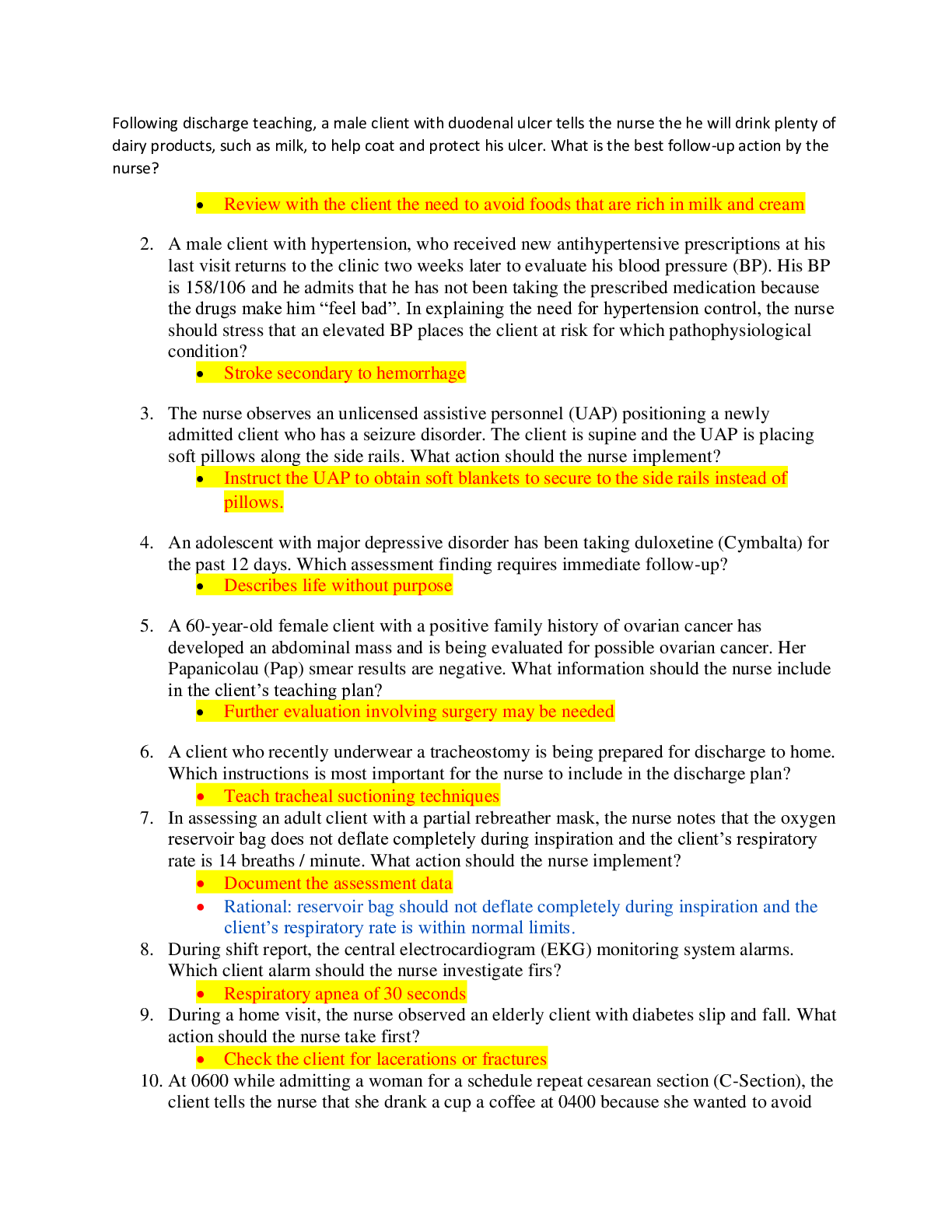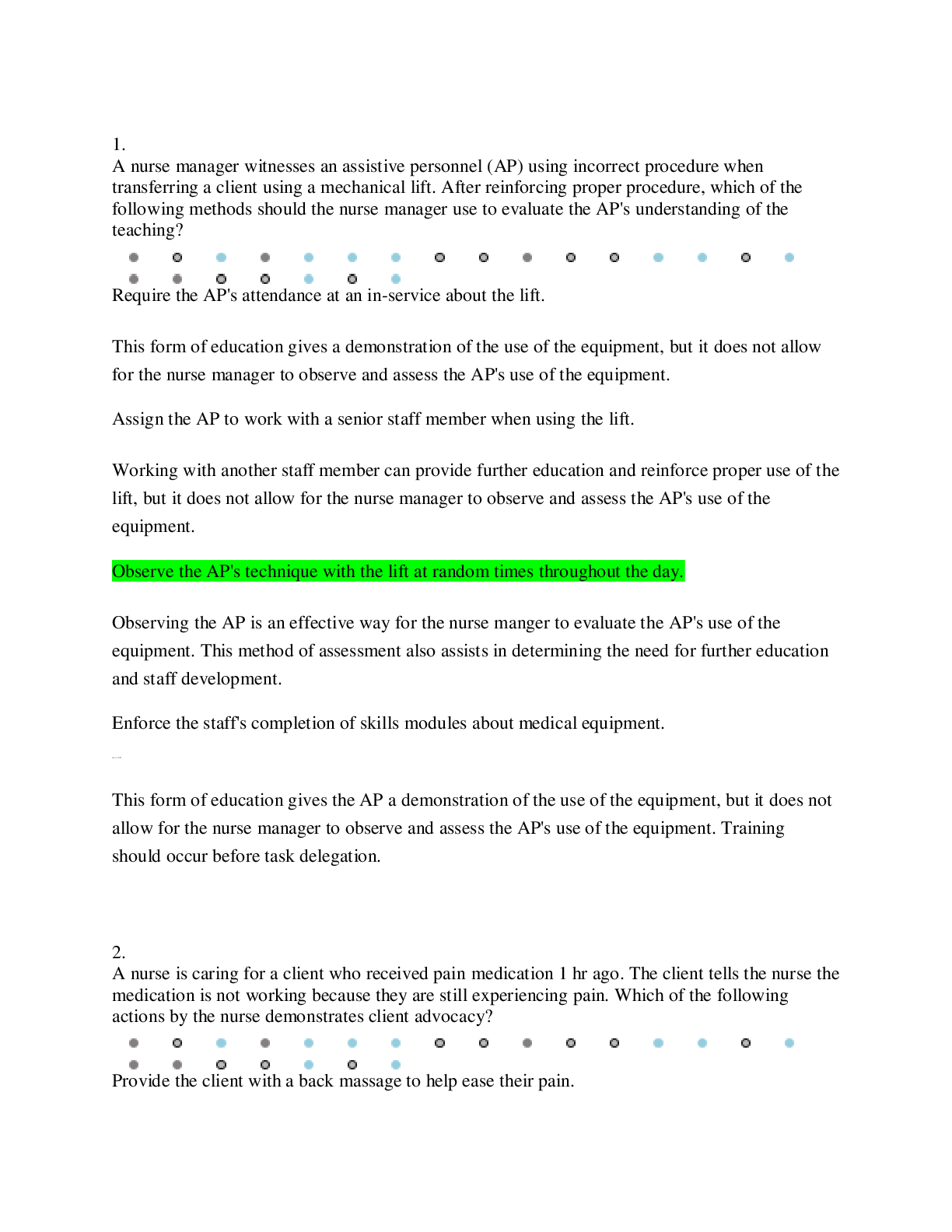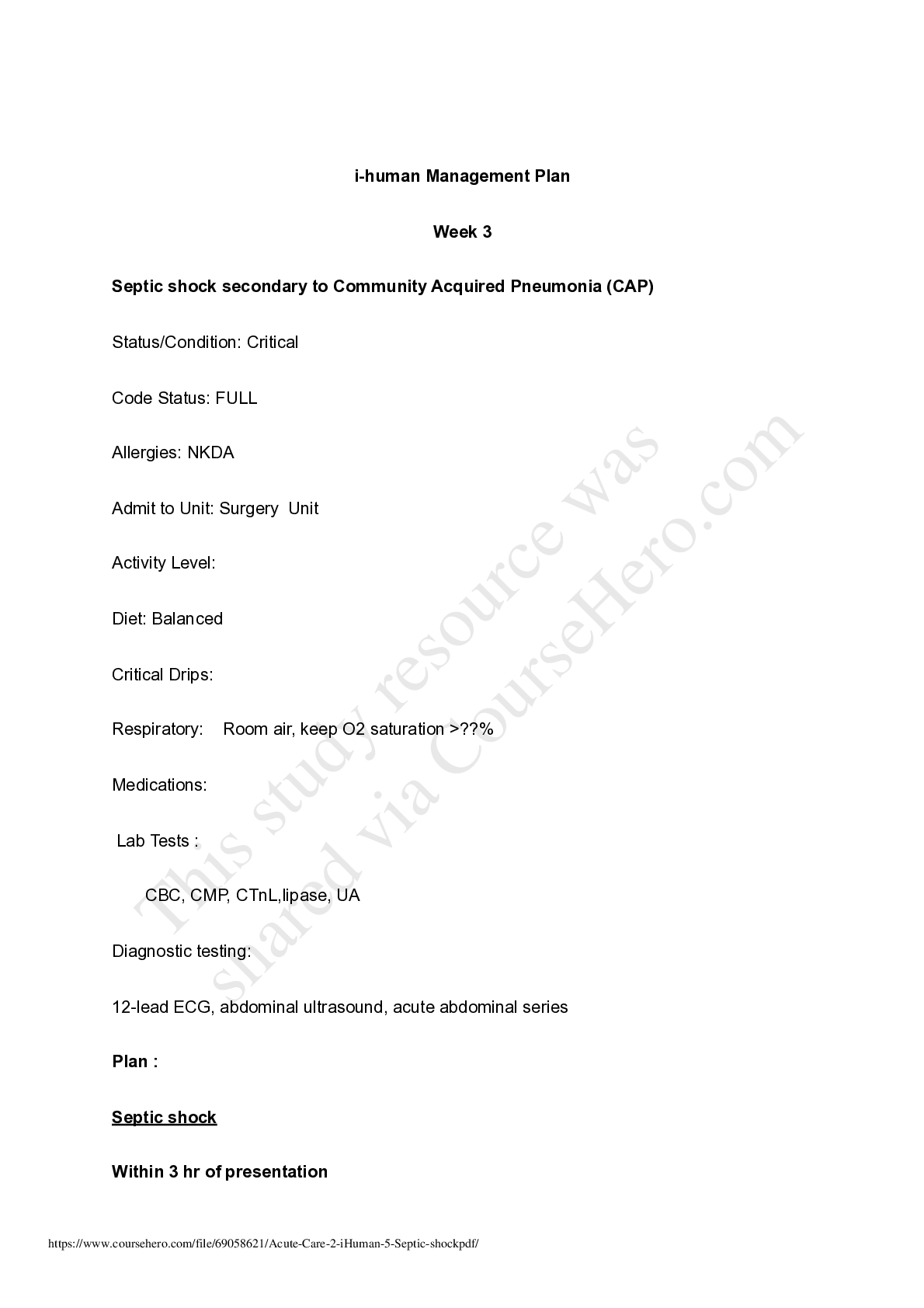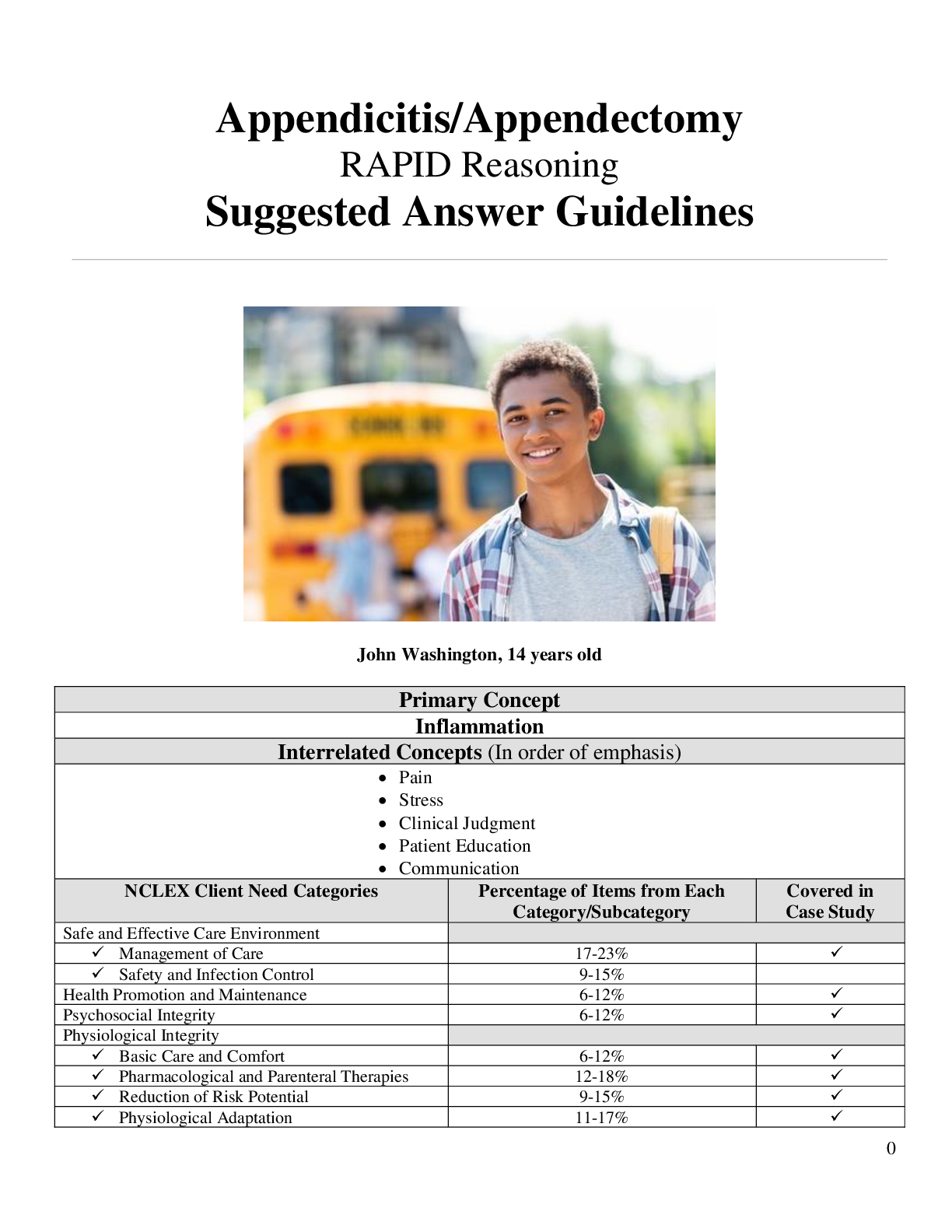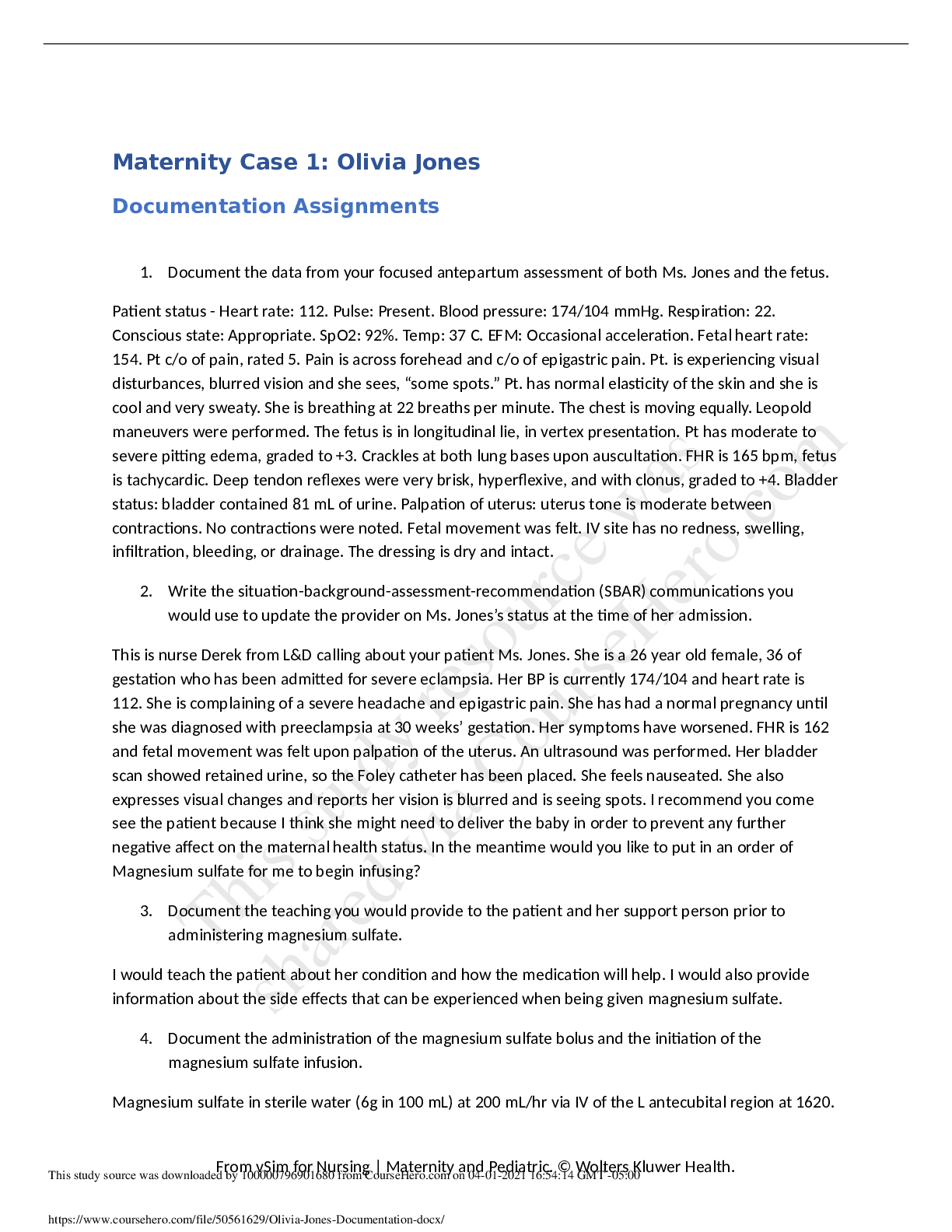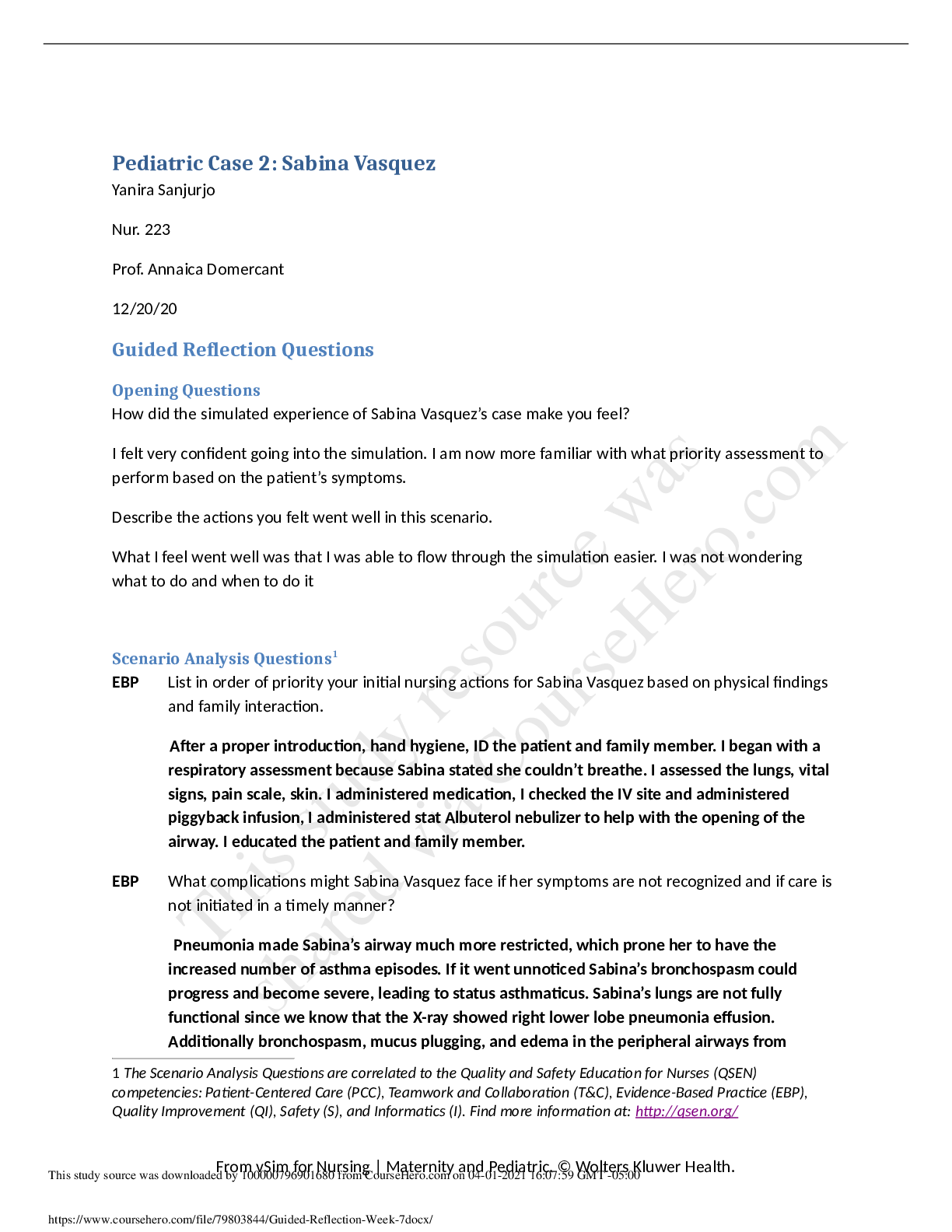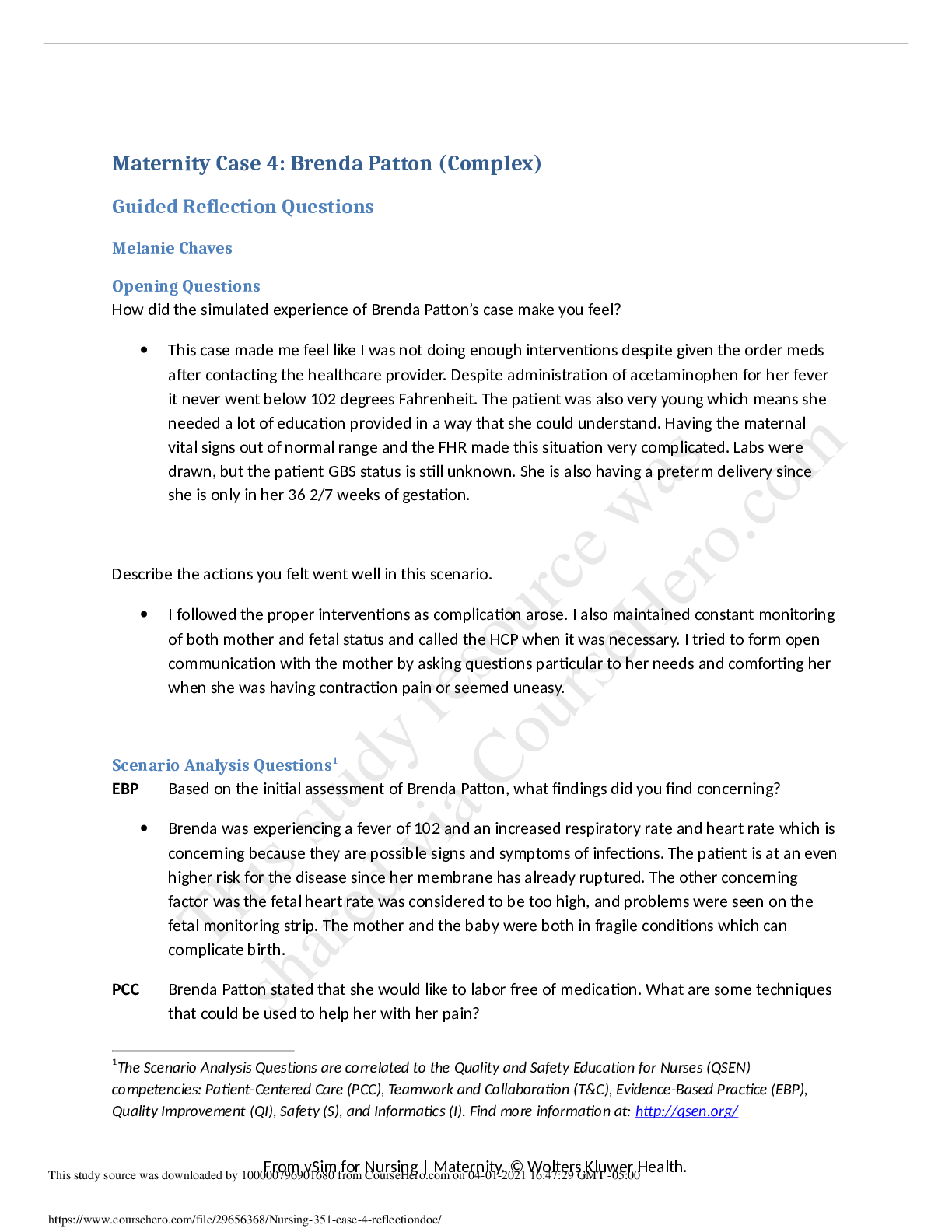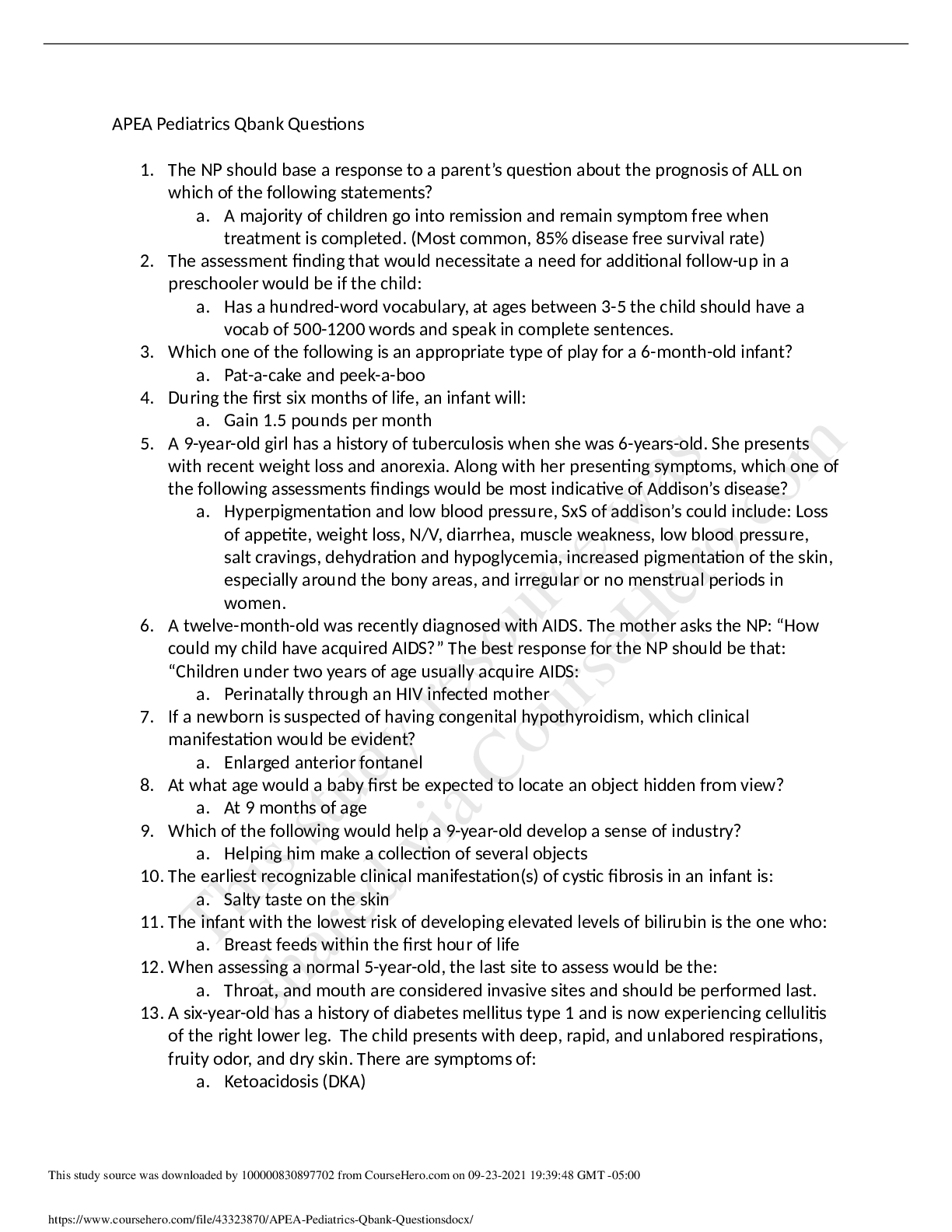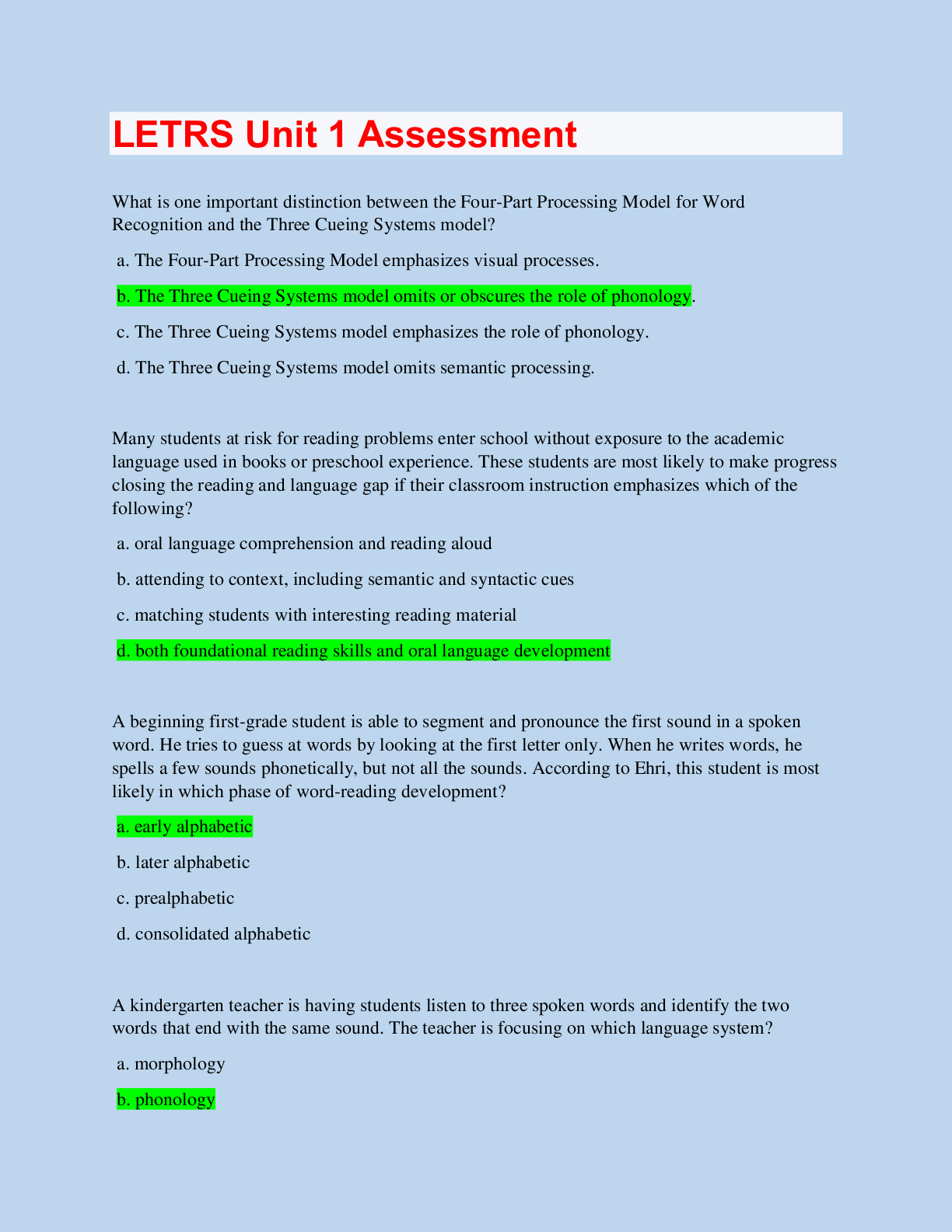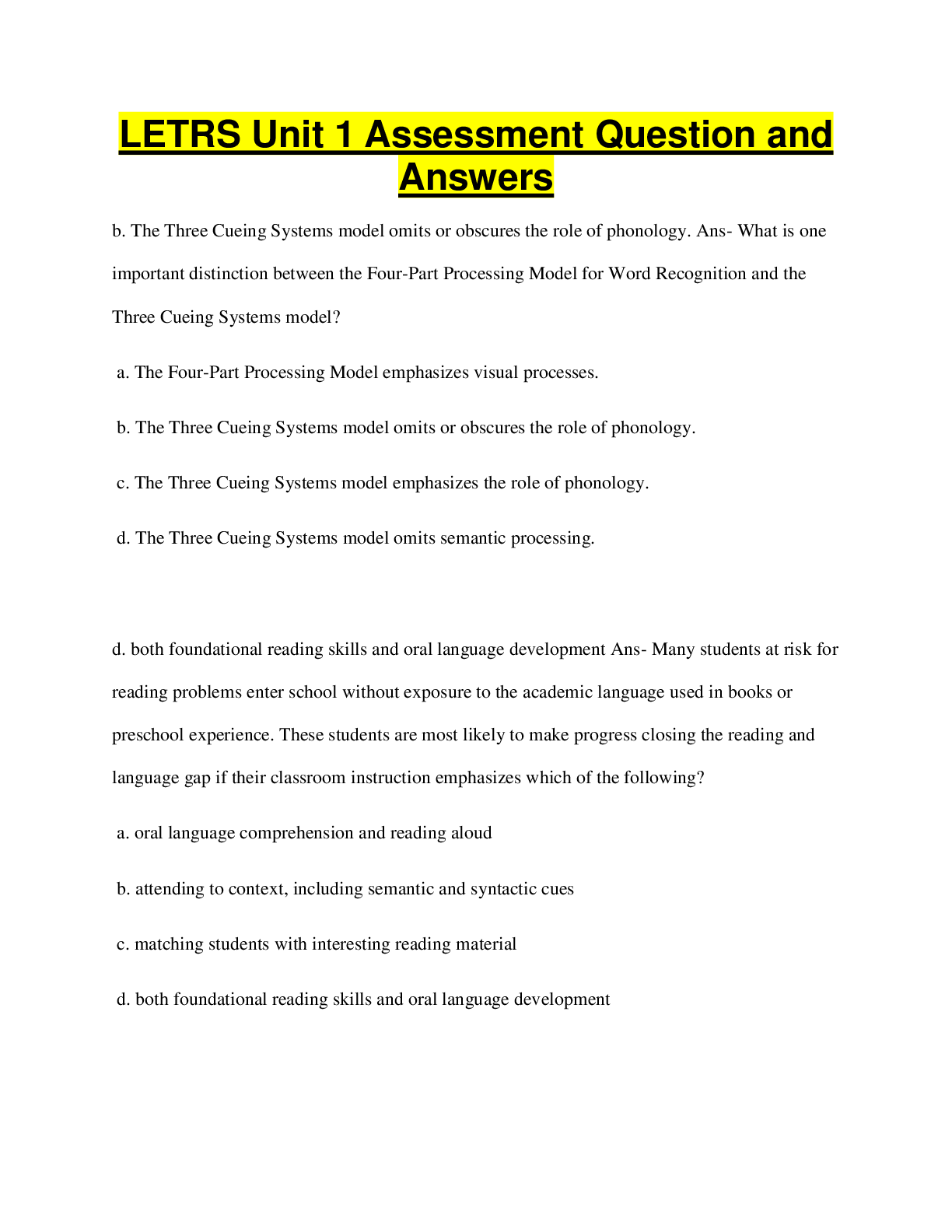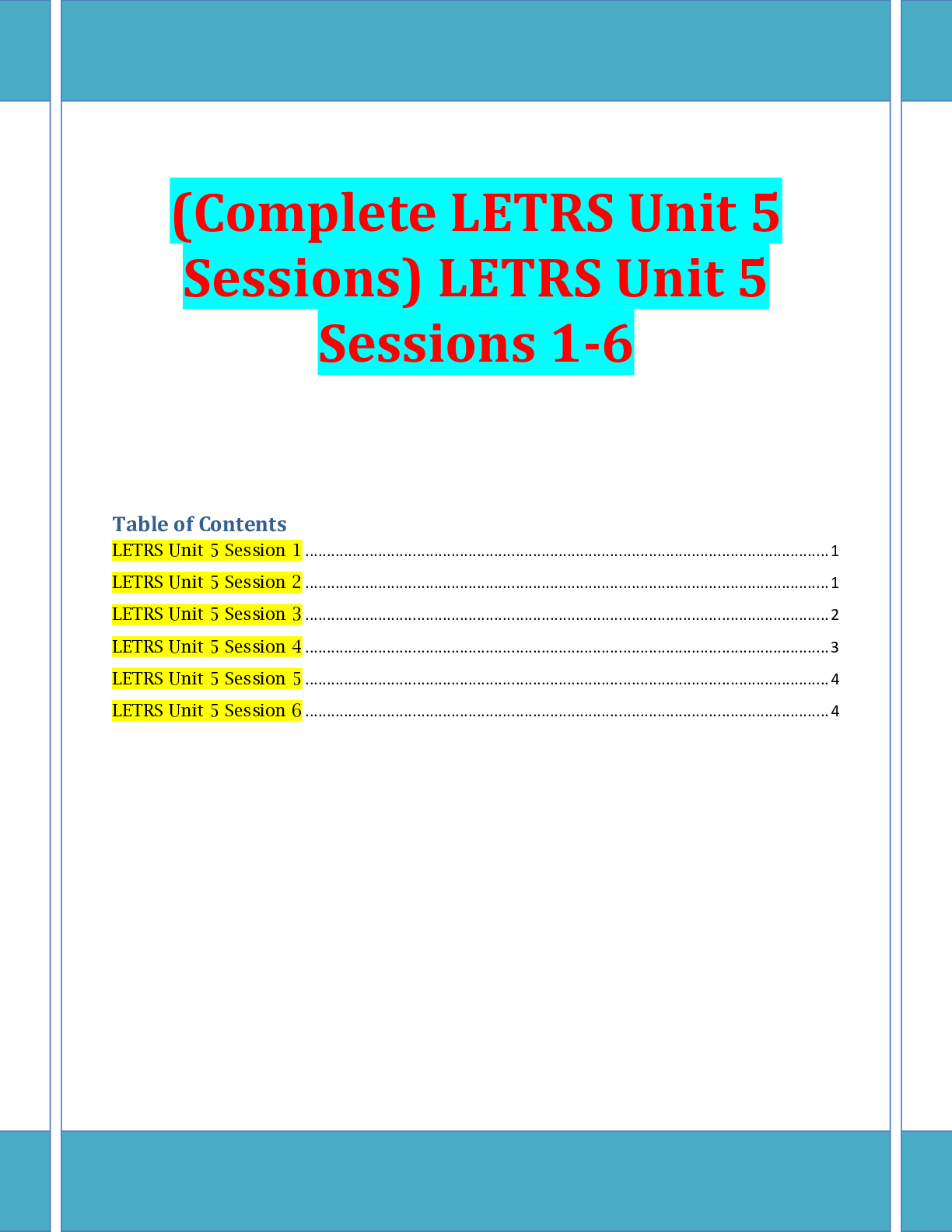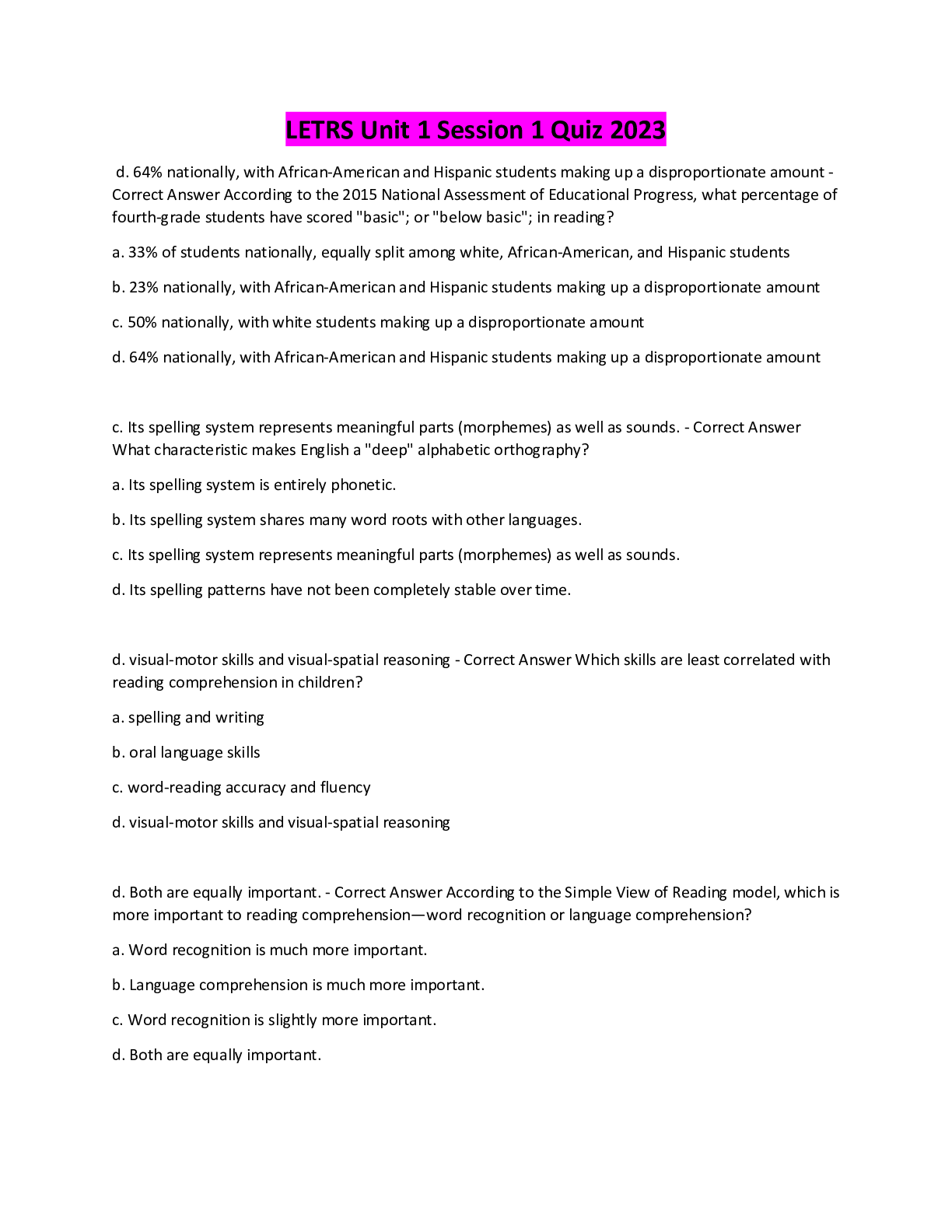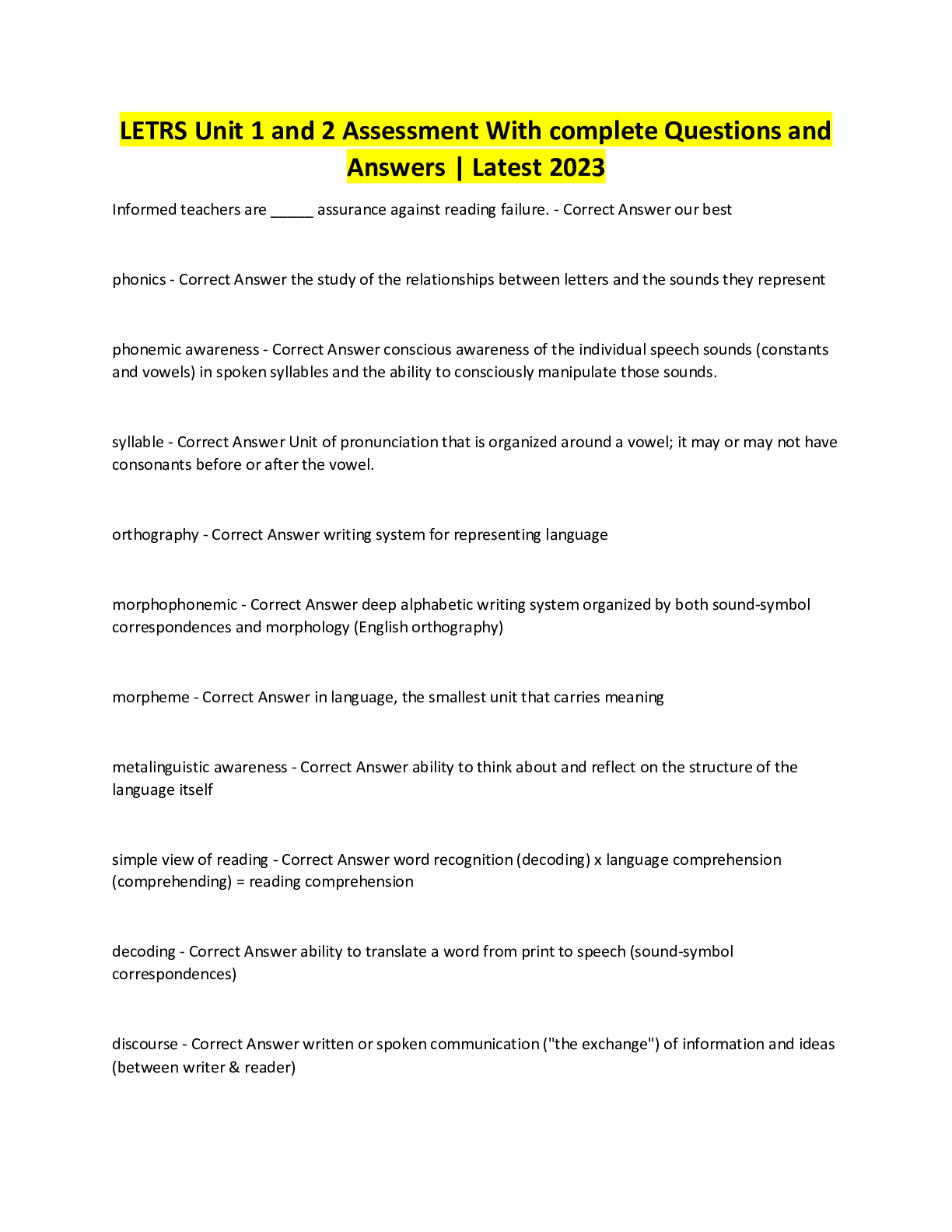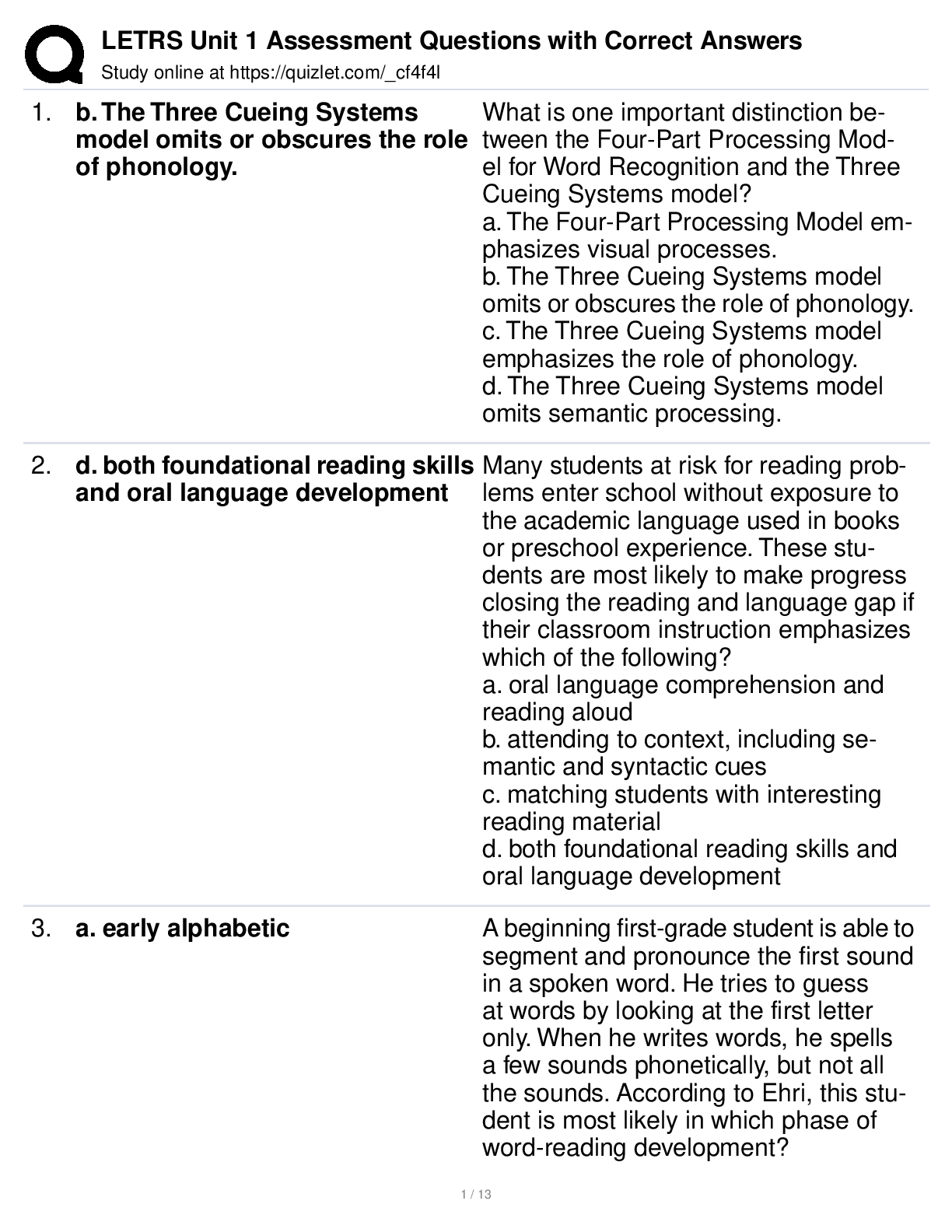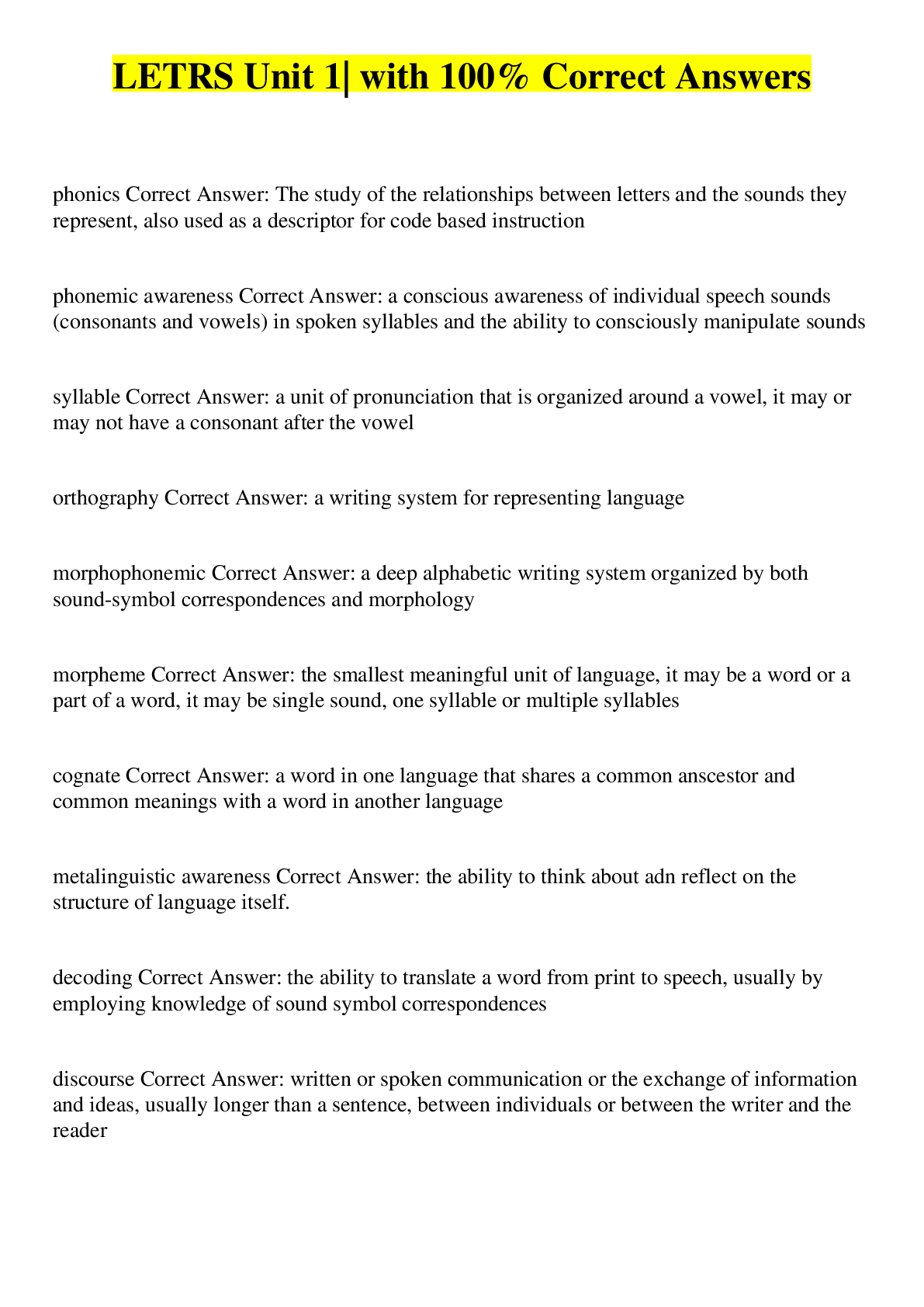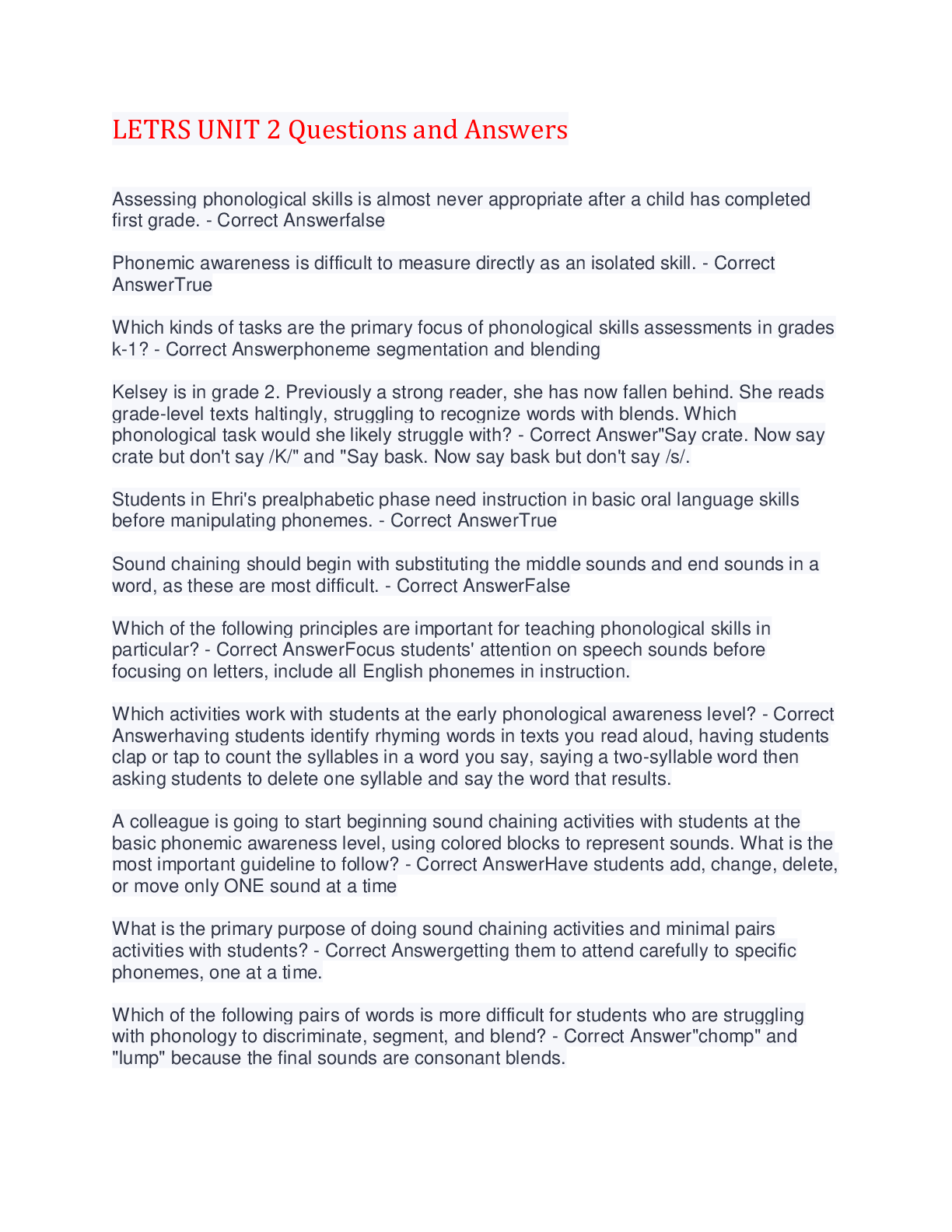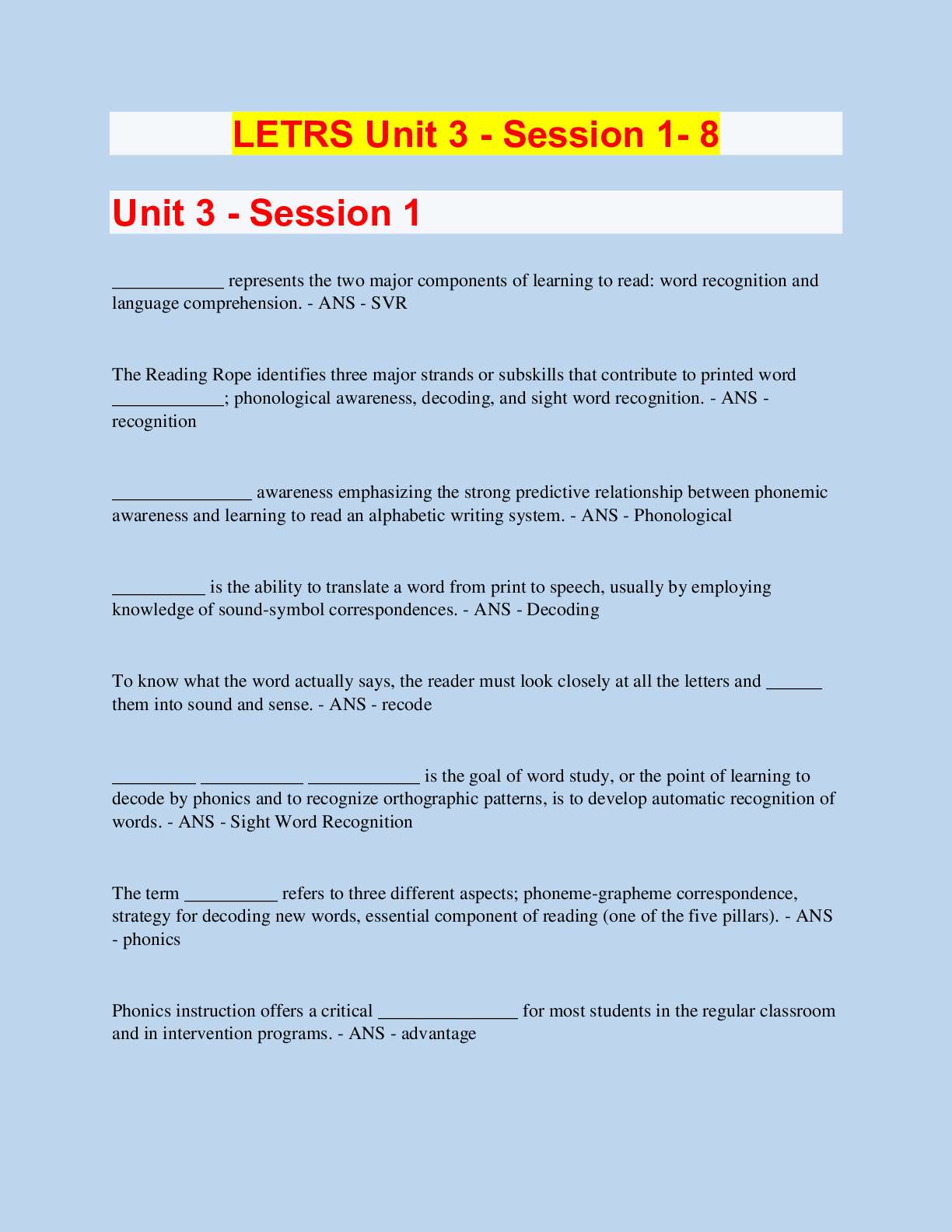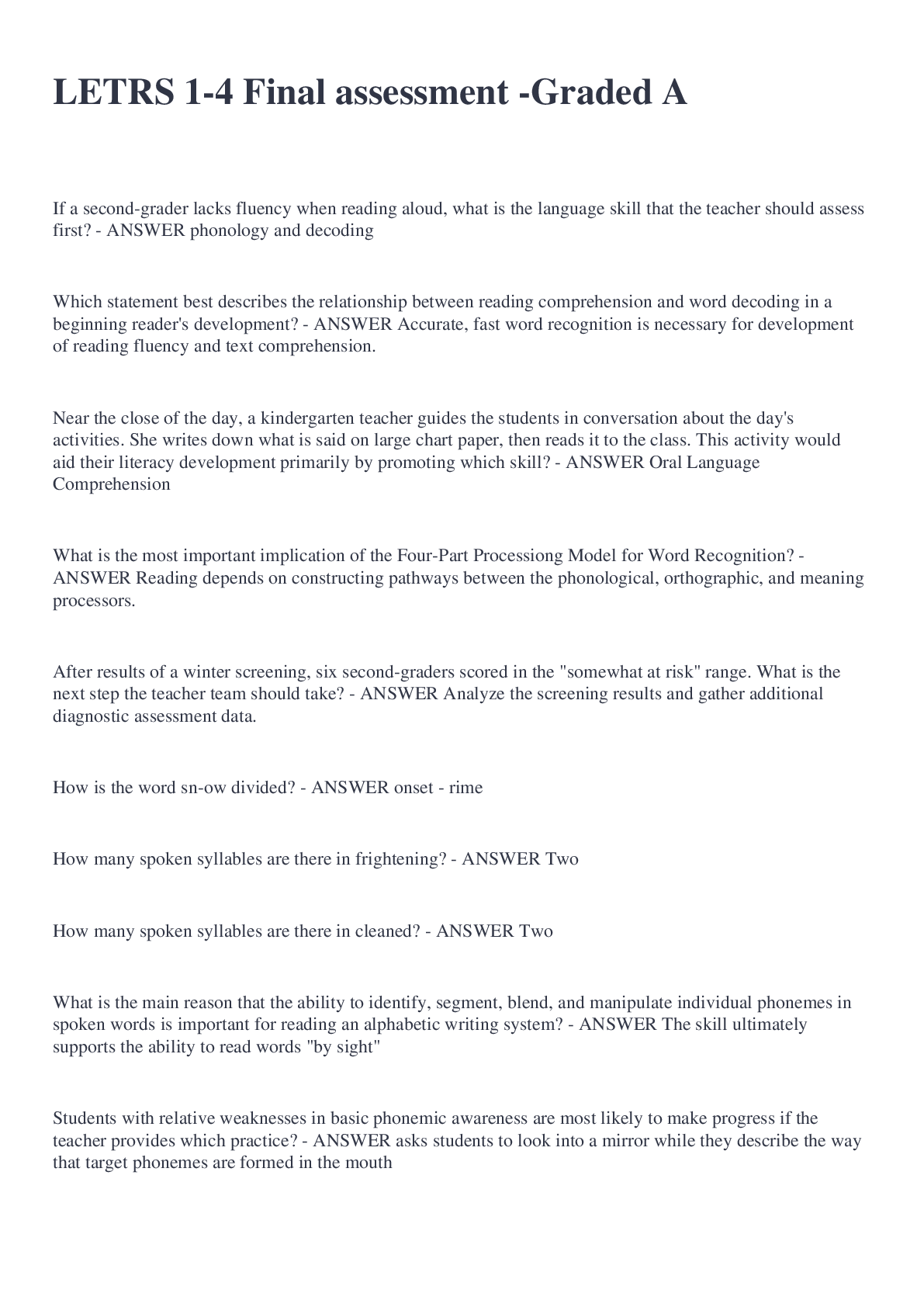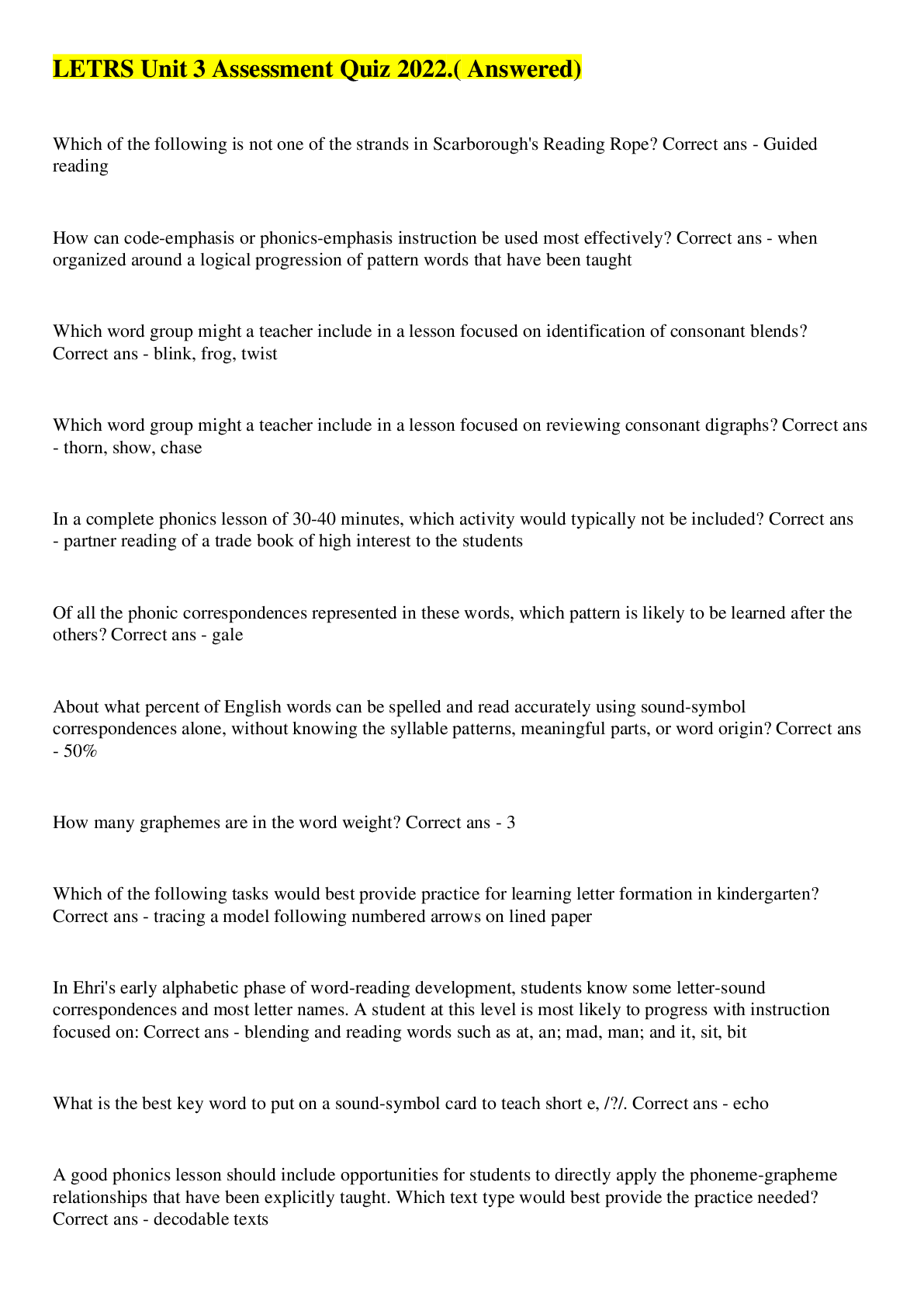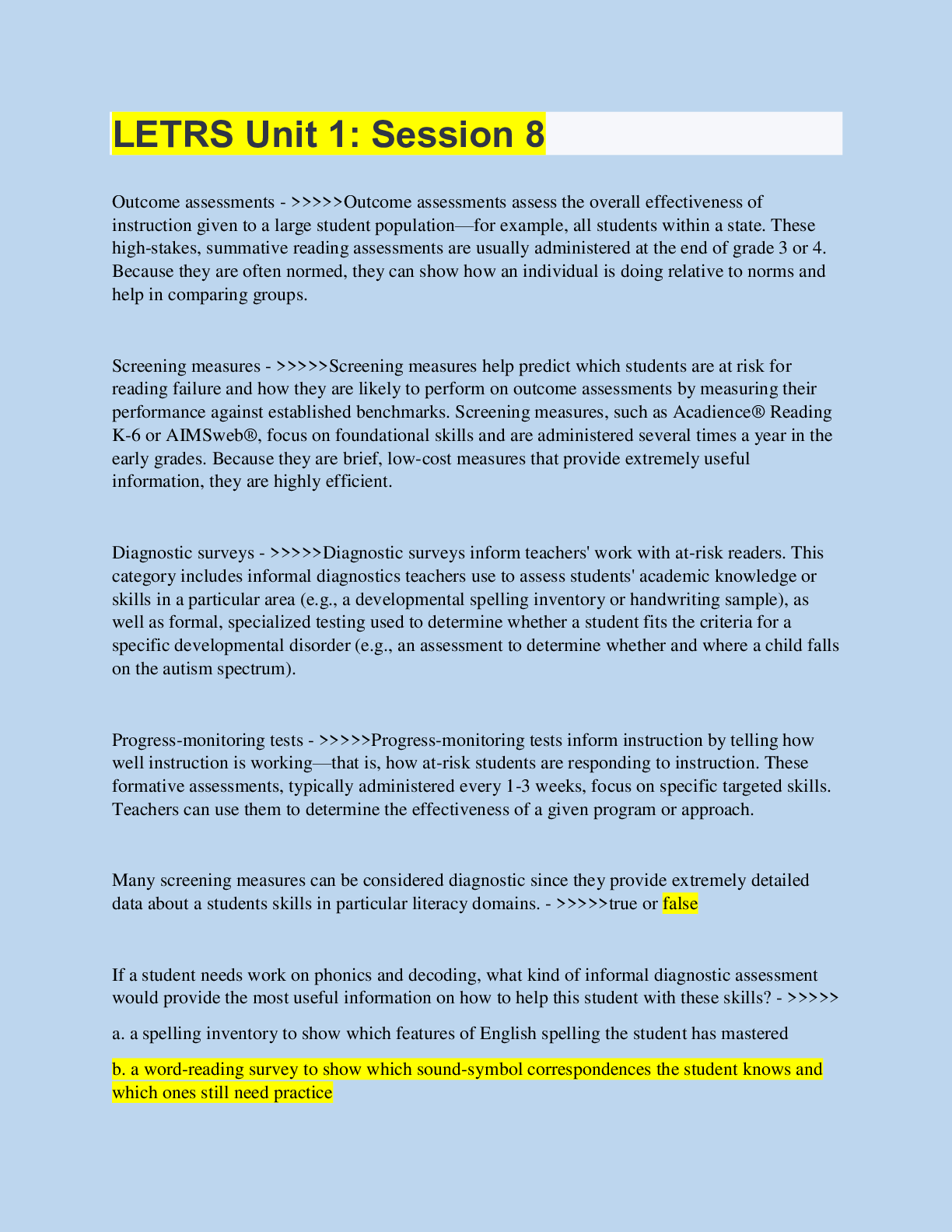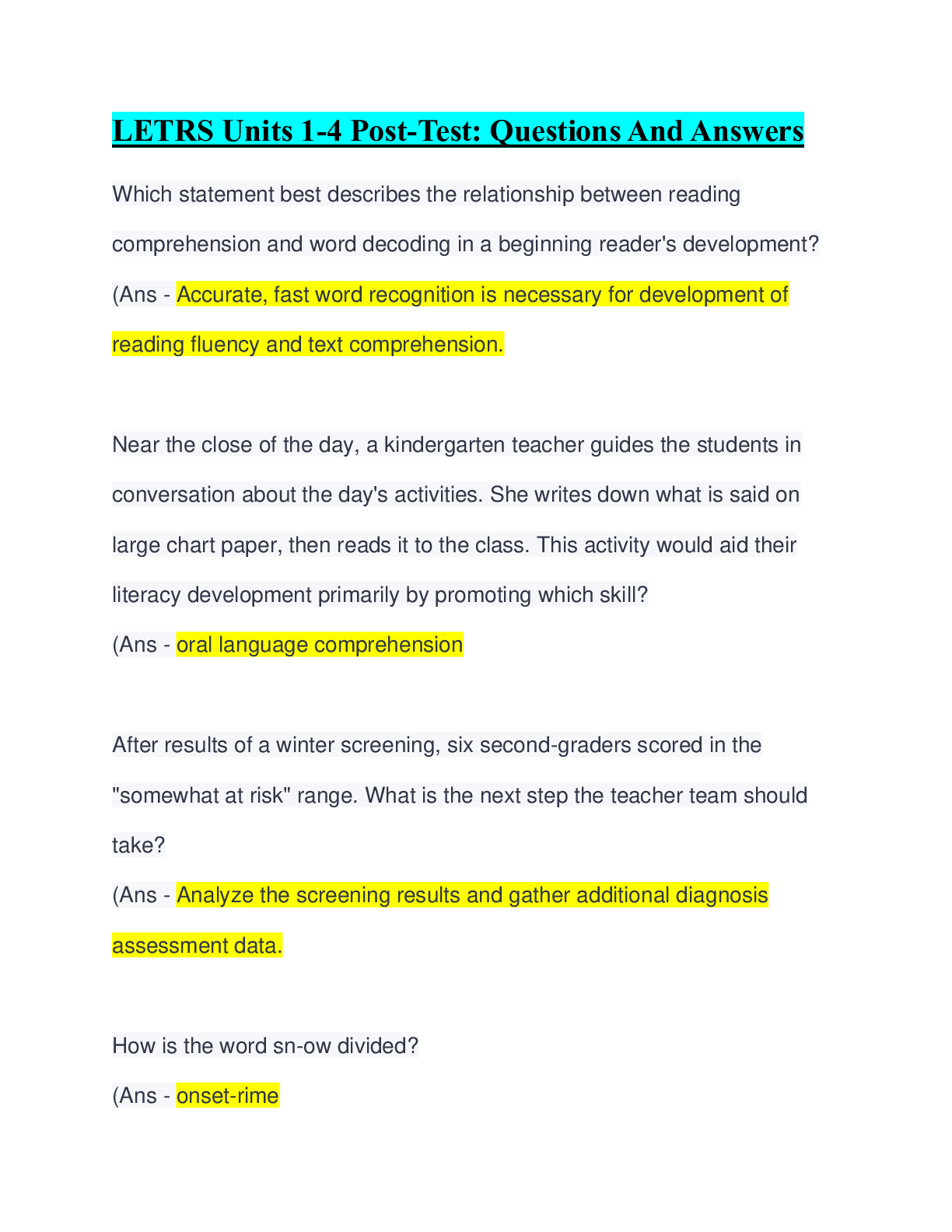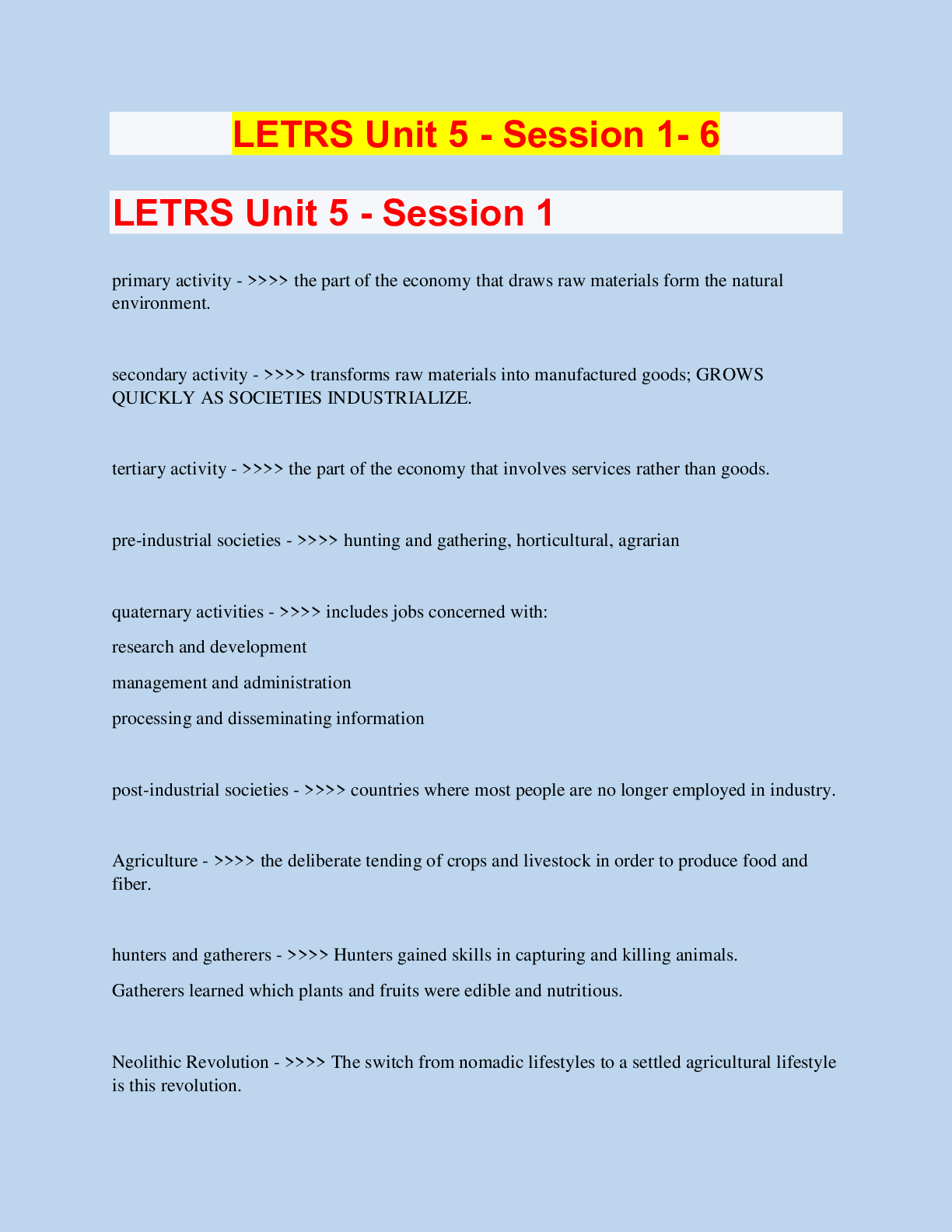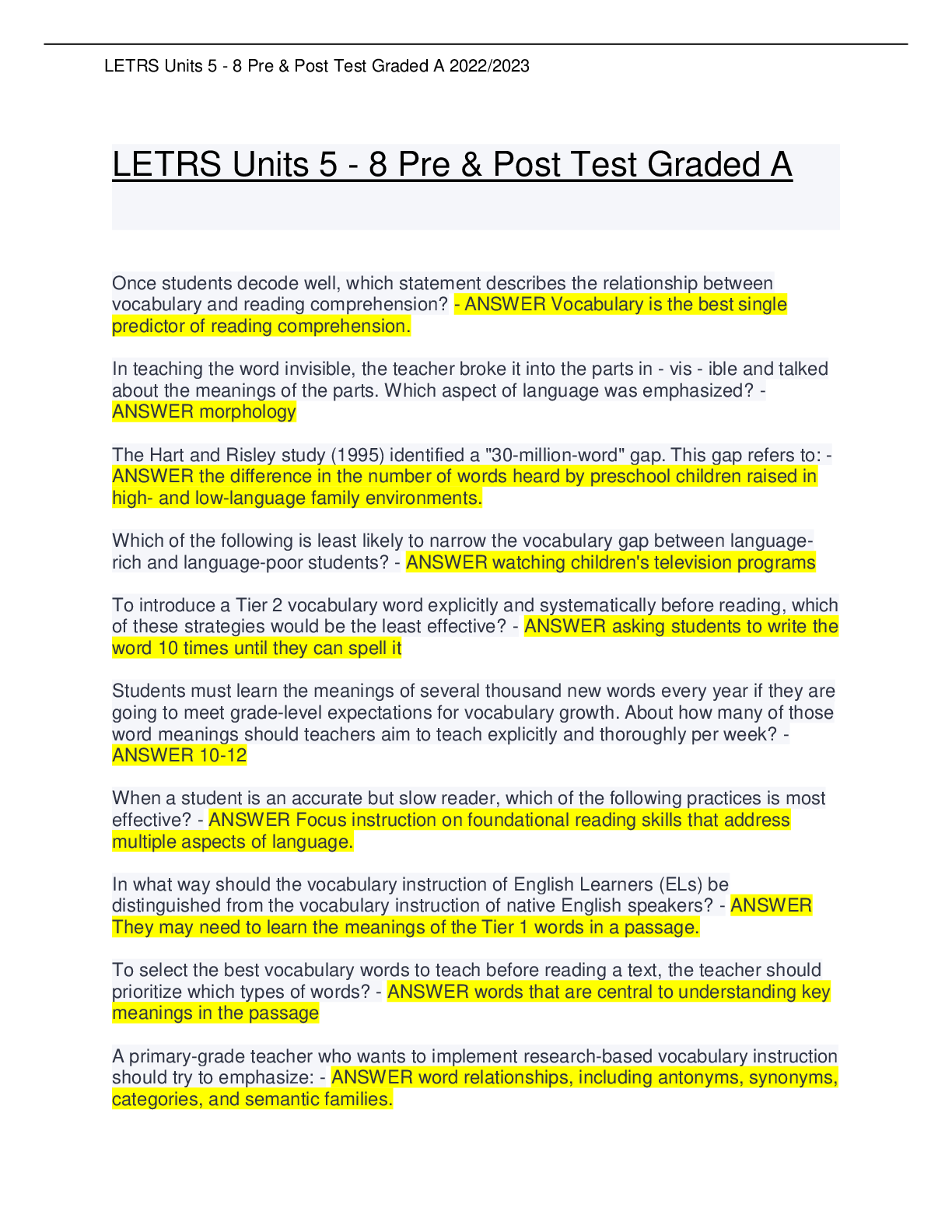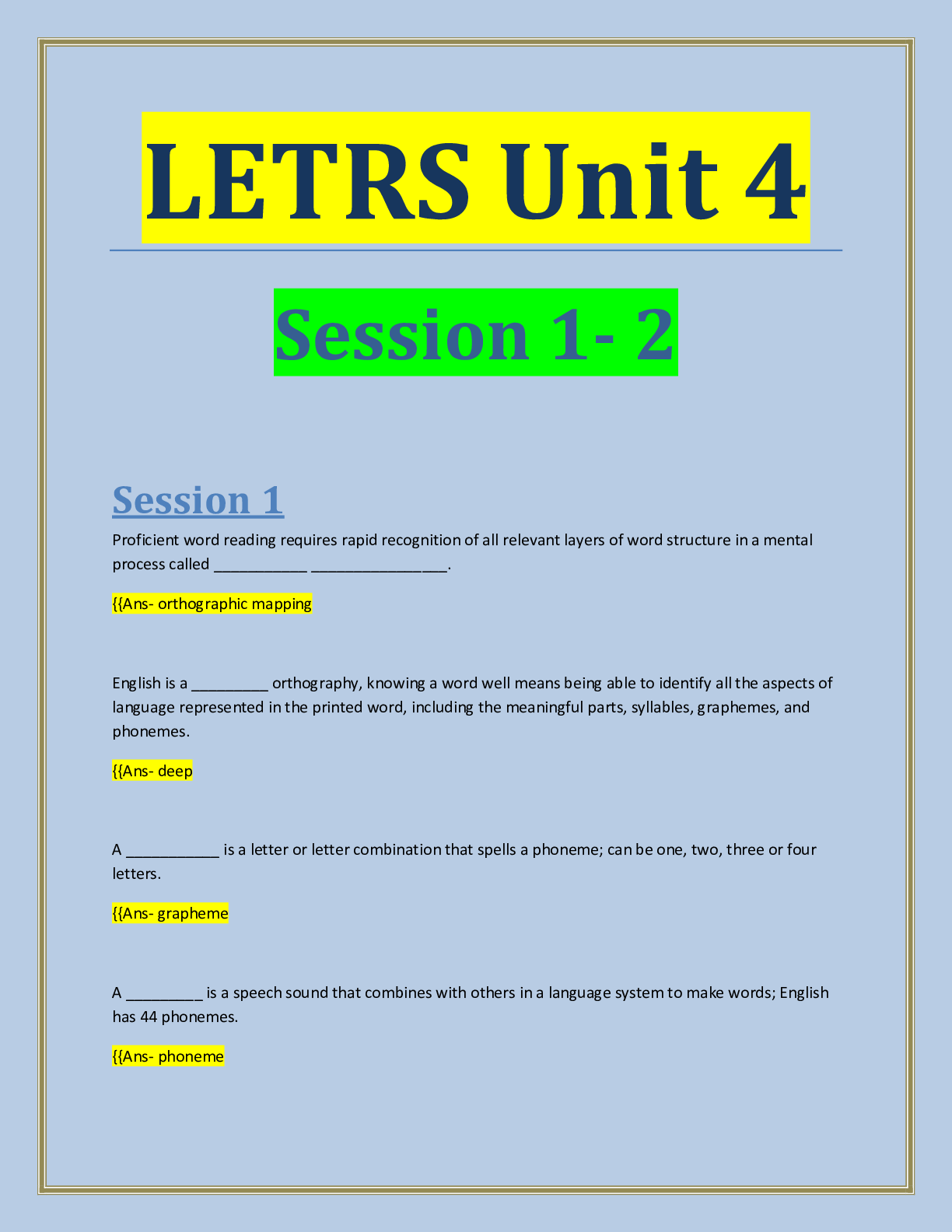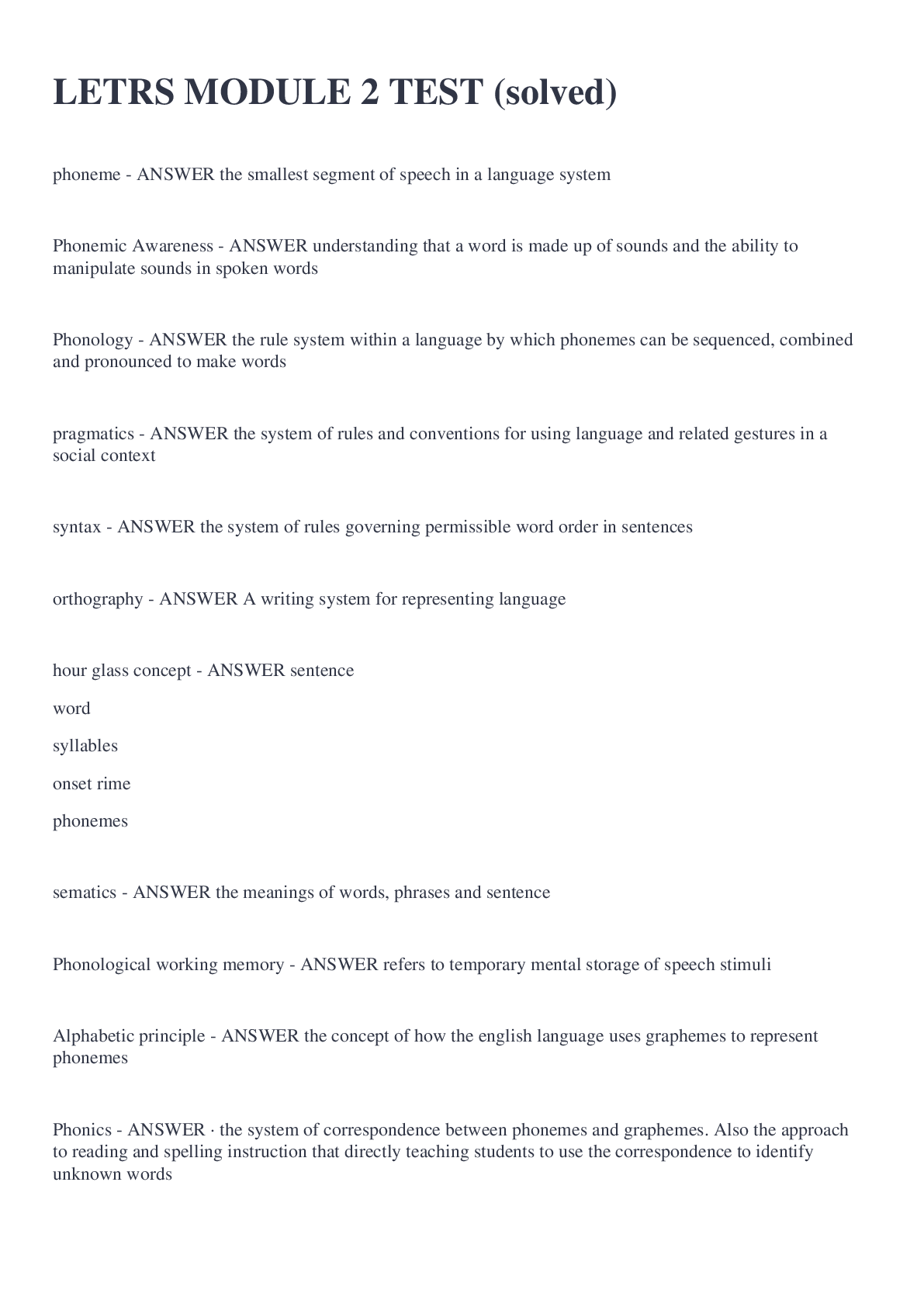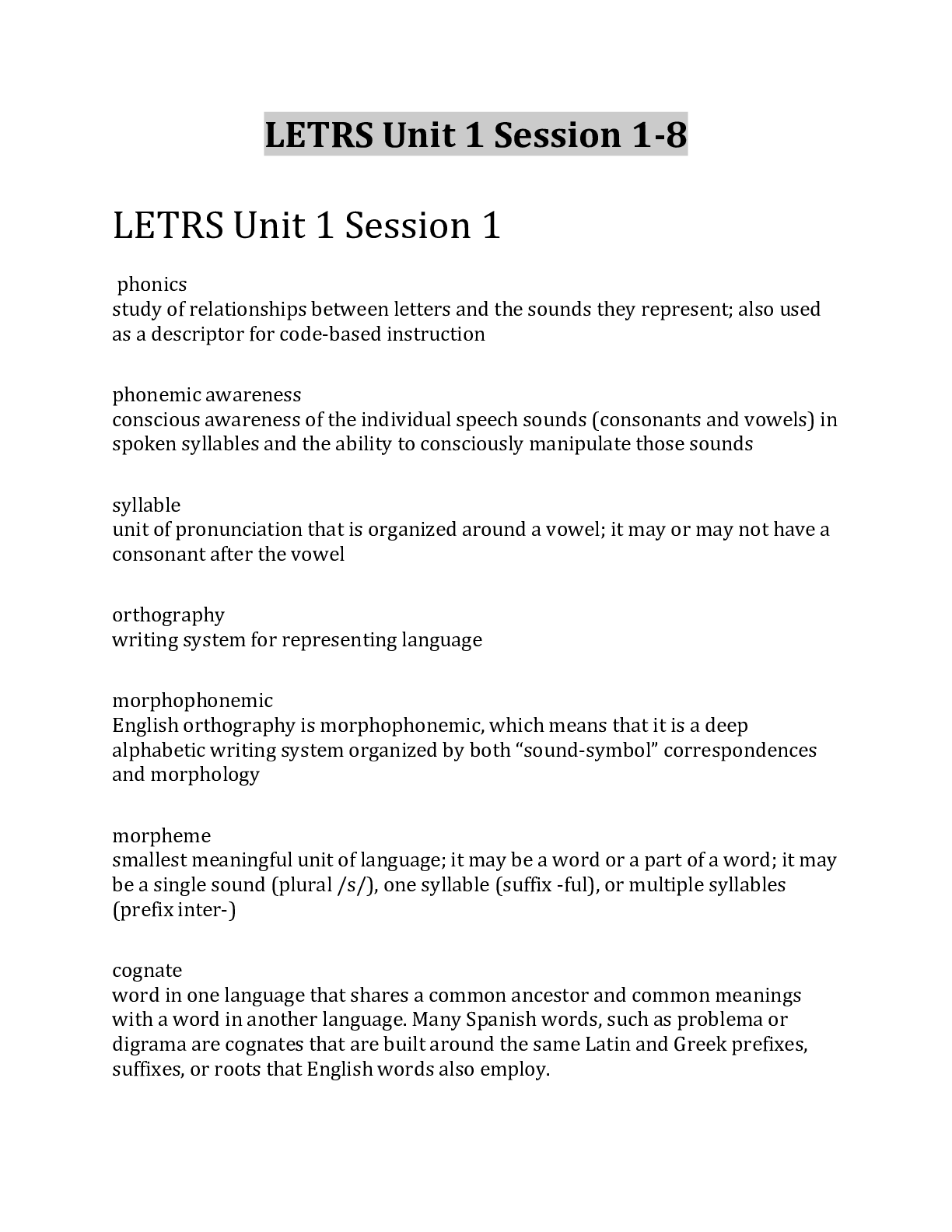Management > EXAM > 111 Solved MCQs of Financial Management MGT201 Latest 2021 (All)
111 Solved MCQs of Financial Management MGT201 Latest 2021
Document Content and Description Below
111 Solved MCQs of Financial Management MGT201 lOMoARcPSD|5967629 111 Solved MCQs of Financial Management MGT201 111 Solved MCQs of Financial Management MGT201 1- is concerned with... the acquisition, financing, and management of assets with some overall goal in mind. • Financial Management • Profit Maximization • Agency Theory • Social Responsibility. 2- is concerned with the maximization of a firm's earnings after taxes. • Shareholder wealth maximization • Profit maximization • Stakeholder maximization • EPS maximization 3- What is the most appropriate goal of the firm? • Shareholder wealth maximization. • Profit maximization. • Stakeholder maximization. • EPS maximization. 4- The decision involves determining the appropriate make-up of the right-hand side of the balance sheet. • Asset management • Financing • Investment • Capital budgeting 5- To whom does the Treasurer most likely report? • Chief Financial Officer. • Vice President of Operations. • Chief Executive Officer. • Board of Directors. 6- The decision involves efficiently managing the assets on the balance sheet on a day-to-day basis, especially current assets. • Asset management. • Financing. • Investment • Accounting 7- Which of the following is not normally a responsibility of the controller of the modern corporation? • Budgets and forecasts. • Asset management. • Financial reporting to the IRS. • Cost accounting. 8- All constituencies with a stake in the fortunes of the company are known as . • Shareholders. • Stakeholders. • Creditors. • Customers 9- One primary macroeconomic variable that helps define and explain the discipline of finance? • Capital structure • Inflation • Technology • Risk 10- Which of the following is a financial statement that states items on a cash basis? • The income statement • The balance sheet • The statement of cash flows • None of the above 11- The ability of a firm to convert an asset to cash is called . • Liquidity • Solvency • Return • Marketability 12- Early in the history of finance, an important issue was: • Liquidity • Technology • Capital structure • Financing options 13- One major disadvantage of the sole proprietorship is . • Simplicity of decision- making • Unlimited liability • Low operational costs • None of the above 14- Which of the following is not a government agency? • Internal Revenue Service (IRS) • Security and Exchange Commission (SEC) • American Accounting Association (AAA) • Federal Deposit Insurance Corporation 15- An investigation of financial statements designed to determine their fairness in relation to generally accepted accounting principles is called which of the following? • Internal control structure External control structure • Bookkeeping • Audit • Management accounting 16- You made a $10,000 loan to your cousin's company. At the end of one year, the company returned to you $10,850. The $850 is called which one of the following? • Return of investment • Return on investment • An 8.5% return on investment • B and C 17- Which of the following shows the details of the company's activities involving cash during a period of time? • Income statement • Statement of financial position • Balance sheet • Revenue - Costs = Profits • None of the above 18- Which of the following shows details and results of the company's profit-related activities for a period of time? • Balance sheet • Income statement • Statement of cash flows • Statement of financial position 19- The personnel, procedures, devices, and records used by an organization to develop accounting information and communicate that information to decision makers are called which of the following? • Audits • Accounting systems • Internal control structures • Personnel systems 20- Which of the following financial statements is also known as a statement of financial position? • Balance sheet • Statement of cash flows • Income statement • None of the above 21- Which of the following refers to recording the routine transactions and day-to- day record keeping of an enterprise? • Financial accounting • Bookkeeping • Tax accounting • Cost and Management accounting 22- Which of the following involves determining the cost of certain business activities and interpreting cost information? • Management accounting • Cost accounting • Financial accounting • Bookkeeping 23- Which of the following provides information that is intended primarily for use by internal management in decision making required to run the business? • Financial accounting • Management accounting • Cost accounting • Tax accounting 24- "Shareholder wealth" in a firm is represented by: • The number of people employed in the firm. • The book value of the firm's assets less the book value of its liabilities. • The amount of salary paid to its employees. • The market price per share of the firm's common stock. 25- The long-run objective of financial management is to: • Maximize earnings per share. • Maximize the value of the firm's common stock. • Maximize return on investment. • Maximize market share. 26- The market price of a share of common stock is determined by: • The board of directors of the firm. • The stock exchange on which the stock is listed. • The president of the company. • Individuals buying and selling the stock 27- The main point of financial management in a firm is: • The creation of value for shareholders. • The dollars profits earned by the firm. • The minimization of the amount of taxes paid by the firm. • The number and types of products or services provided by the firm. 28- The decision function of financial management can be broken down into the decisions. • Financing and investment • Investment, financing, and asset management • Financing and dividend • Capital budgeting, cash management, and credit management 29- The controller's responsibilities are primarily _________ in nature, while the treasurer's responsibilities are primarily related to . • Operational; financial management • Financial management; accounting • Accounting; financial management • Financial management; operations. 30- A company's is (are) potentially the most effective instrument of good corporate governance. • Common stock shareholders • Board of directors • Top executive officers • Shareholder 31- Which of the following enjoys limited liability? • A general partnership. • A corporation. • A sole proprietorship. • None of the above. 32- A corporation in which you are a shareholder has just gone bankrupt. Its liabilities are far in excess of its assets. You will be called on to pay: • A proportionate share of bondholder claims based on the number of common shares that you own. • A proportional share of all creditor claims based on the number of common shares that you own. • An amount that could, at most, equal what you originally paid for the shares of common stock in the corporation. • Nothing. 33- A major advantage of the corporate form of organization is: • Reduction of double taxation. • Limited owner liability. • Legal restrictions. • Ease of organization. 34- The principle of financial markets is to: • Allocate savings efficiently. • Lower the yield on bonds. • Manage inflation. • Boost the price of common stocks. 35- How are funds allocated efficiently in a market financial system? • The most powerful economic unit receives the funds. • The economic unit that considers itself most in need of funds receives them. • The economic unit that is willing to pay the highest expected return receives the funds. • Receipt of the funds is rotated so that each economic unit can receive them in turn. 36- In 3 years you are to receive $5,000. If the interest rate were to unexpectedly raise, the present value of that future amount to you would • Go down. • Go up. • Remain unchanged. • Cannot be determined without more information. 37- To increase a given current value, the discount rate should be adjusted: • Downward. • True. • Fred. • Upward. 38- What's the worth to you of a $1,000 face-value bond with an 8% coupon rate when your required rate of return is 15 percent? • More than its face value. • True. • $1,000. • Less than its face value. 39- If the intrinsic value of a stock is bigger than its market value, which of the following is a realistic conclusion? • The stock has a low level of risk. • The market is undervaluing the stock. • The stock offers a high dividend payout ratio. • - The market is overvaluing the stock. 40- When the market's required rate of return for a particular bond is much less than its coupon rate, the bond is selling at: • Face value. • A premium. • Cannot be determined without more information. • A discount. 41- If an investor may have to sell a bond prior to maturity and interest rates have risen since the bond was purchased, the investor is exposed to • Interest rate risk. • the coupon effect. • a perpetuity. • an indefinite maturity. 42- PIA will pay a $4 dividend next year on its common stock, which is at present selling at $100 per share. What is the market's required return on this investment if the dividend is likely to grow at 5% forever? • 4 percent. • 9 percent. • 7 percent. • 5 percent. 43- Interest rates and bond prices: • Sometimes move in the same direction, sometimes in opposite directions. • Have no relationship with each other (i.e., they are independent). • Move in opposite directions. • Move in the same direction. 44- The likely rate of return on a bond if bought at its current market price and held to maturity. • Yield to maturity • Capital gains yield • Coupon yield • Current yield 45- Following type of risk is preventable through good diversification. • Portfolio risk • Unsystematic risk • Total risk • Portfolio risk 46- An "aggressive" common stock would have a "beta" • Equal to zero. • Greater than one. • Equal to one. • Less than one. 47- According to the capital-asset pricing model (CAPM), a security's likely (required) return is equal to the risk-free rate plus a premium. • Based on the systematic risk of the security. • Based on the unsystematic risk of the security. • Equal to the security's beta. • Based on the total risk of the security. 48- The risk-free security has a beta equal to , while the market portfolio's beta is equal to . • zero; one. • less than zero; more than zero. • one; less than one. • one; more than one. 49- Beta is the slope of” • The security market line. • The capital market line. • A characteristic line. • The CAPM. 50- Verify a firm's total asset turnover (TAT) if its net profit margin (NPM) is 5 percent, total assets are $8 million, and ROI is 8 percent. • 1.60 Total Asset Turnover = (Return on Investment / Net Profit Margin) • 4.50 = (0.08/.05) • 2.05 = 1.6 • 2.50 51- ABC Pvt Ltd has an 8 percent return on total assets of Rs. 300,000 and a net profit margin of 5%. What are its s • 3,750,000 • 1,500,000 • 480,000 • 300,000 Total Asset Turnover = (ROI / NPM) = (0.08/.05) = 1.6 Sales = (Total Asset Turnover * Total Assets) = 1.6 * 300, 000 = 480, 000 52- The gross profit margin is unmoved, however the net profit margin declined over the same period. This could have happened if • Cost of goods sold increased relative to sales. • Sales increased relative to expenses. • Dividends were decreased. • Government increased the tax rate. 53- A company can improve its debt-to-total assets ratio by doing which of the following? • Sell common stock. • Shift short-term to long-term debt. • Shift long-term to short-term debt. • Borrow more. 54- ABC Company had sales last year of Rs. 265 million, together with cash sales of Rs. 25 million. If its average collection period was 36 days, it’s ending accounts receivable balance is closest to . (suppose a 365-day year.) • 7.4 million • 23.7 million • 18.7 million • 26.1 million According to the accounting occupation, which of the following would be measured a cash-flow item from an "investing" activity? • Cash outflow to acquire fixed assets. • Cash inflow from dividend income. • Cash inflow from interest income. • All of the above. 55- Uses of funds include a (an): • Decrease in cash. • Increase in fixed assets. • Tax refund. • Decrease in cash. 56- Which of the following would be included in a cash budget? • Depreciation charges. • Patent amortization. • Goodwill. • Dividends. 57- Which of the following is NOT a cash outflow for the firm? • Interest payments. • Dividends. • Depreciation. • Taxes. 58- "Working capital" means the same thing as • Current assets less Current liabilities. • Fixed assets. • Current assets. • Total assets. 59- Which asset-liability mixture would most probable result in the firm's having the most risk of technical insolvency? • Increasing current assets while lowering current liabilities. • Increasing current assets while incurring more current liabilities. • Reducing current assets, increasing current liabilities, and reducing long- term debt. • Replacing short-term debt with equity. 60- Which of the following demonstrates the use of a hedging (or matching) approach to financing? • Short-term assets financed with long-term liabilities. • Permanent working capital financed with long-term liabilities. • Short-term assets financed with equity. • All assets financed with a 50 percent equity, 50 percent long-term debt mixture. 61- varies inversely with profitability. • Liquidity. • False. • Blue. • Risk. 62- Impulsive financing includes: • Accounts receivable. • A line of credit. • Short-term loans. • Accounts payable. 63- Permanent working capital means • Is the amount of current assets required to meet a firm's long-term minimum needs? • Includes accounts payable. • Includes fixed assets. • Varies with seasonal needs. 64- Net working capital refers to • Current assets. • Total assets minus fixed assets. • Current assets minus current liabilities. • Current assets minus inventories. 65- Marketable securities are primarily: • Long-term equity securities. • Short-term equity securities. • Long-term debt instruments. • Short-term debt instruments. 66- Which of the following marketable securities is the responsibility of a commercial bank? • T-bills • Negotiable certificate of deposit • Repurchase agreement • Commercial paper 67- The most basic requirement for a firm's marketable securities. • Marketability • KSE • Yield • Safety 69 - If EOQ = 360 units, order costs are $5 per order, and carrying costs are $.20 per unit, what is the usage in units? • 18,720 units • 2,592 units • 25,920 units • 129,600 units ` MCQS 70- Costs of not carrying sufficient inventory include: • Possible worker layoffs. • Customer disappointment. • Lost sales. • All of these. 71- An increase in the firm's receivable turnover ratio means that: • It has initiated more liberal credit terms. • Cash sales have decreased. • It is collecting credit sales more quickly than before. • Inventories have increased. 72- Receiving a required inventory item at the exact time needed. • Just in Time (JIT) • Free on Board (FOB) • Program Evaluation and Review Technique (PERT) 73- EOQ is the order quantity that over our planning prospect. • Minimizes total ordering costs • Minimizes total inventory costs • The required safety stock • Minimizes total carrying costs 74- A B2B exchange is a Internet marketplace that matches supply and demand by real-time auction bidding. • business-to-business • buyer-to-buyer • buyer-to-business • business-to-buyer 75- When a firm needs short-term funds for a specific purpose, the bank loan will likely be a: • Revolving credit agreement. • Compensating balance arrangement. • Transaction loan. • Line of credit. 76- A formal, legal commitment to extend credit up to some maximum amount over a stated period of time • Revolving credit agreement • Line of credit • Trade credit • Letter of credit 77- All of the following influence capital budgeting cash flows EXCEPT: • Accelerated depreciation. • Tax rate changes. • Salvage value. • Method of project financing used. 78- In proper capital budgeting analysis we calculate incremental: • Accounting income. • Operating profit. • Earnings. • Cash flow. 79- In estimating "after-tax incremental operating cash flows" for a project, you should include all of the following EXCEPT: • Changes in working capital resulting from the project, net of spontaneous changes in current liabilities. • Effects of inflation. • Opportunity costs. • Sunk costs. 80- A capital investment is one that • Applies only to investment in fixed assets. • Is only undertaken by large corporations. • Has the prospect of short-term benefits. • Has the prospect of long-term benefits. 81- Ahmad is considering automating his Glass factory with the purchase of a Rs. 475,000 machine. Shipping and installation would cost Rs. 5,000. Ahmad has calculated that automation would result in savings of Rs. 45,000 a year due to reduced scrap and Rs. 65,000 a year due to reduced labor costs. The machine has a useful life of 4 years and falls in the 3-year property class for depreciation purposes. The estimated final salvage value of the machine is Rs. 120,000. The firm's marginal tax rate is 34 percent. The incremental cash outflow at time period 0 is closest to • 480,000. • 580,000. • 380,000. • 280,000. 82- Which of the following statements is correct? • If the NPV of a project is greater than 0, its PI will equal 0. • If the IRR of a project is greater than the discount rate, k, its PI will be less than 1 and its NPV will be greater than 0. • If the PI of a project is less than 1, its NPV should be less than 0. • If the IRR of a project is 0%, its NPV, using a discount rate, k, greater than 0, will be 0. 83- If capital is to be rationed for only the current period, a firm should most likely first consider selecting projects by descending order of . • Internal rate of return (IRR) • Profitability index (PI) • Payback period (PBP) • Net present value (NPV) 84- The method provides correct rankings of mutually exclusive projects, when the firm is not subject to capital rationing. • Internal rate of return (IRR) • Profitability index (PI) • Payback period (PBP) • Net present value (NPV) 85- The investment proposal with the greatest relative risk would have • The lowest opportunity loss likelihood. • The highest standard deviation of net present value. • The highest expected value of net present value. • The highest coefficient of variation of net present value. 86- Probability-tree examination is best used when cash flows are likely to be • Associated to the cash flows in previous periods. • Risk- free. • Independent over time. • Known with certainty. 87- If two projects are completely independent (or unrelated), the measure of correlation between them is: • 0 • 2 • 4 • 5 88- A firm's degree of operating leverage depends primarily upon its • Closeness to its operating break-even point. • Level of fixed operating costs. • Sales variability. • Debt-to-equity ratio. 89- "Capital structure" refers to: • Total assets minus liabilities. • Shareholders' equity. • Long-term debt, preferred stock, and common stock equity. • Current assets and current liabilities. 90- The usual approach towards the valuation of a company assumes: • That there is an optimum capital structure. • That the overall capitalization rate holds constant with changes in financial leverage. • That total risk is not altered by changes in the capital structure. • That markets are perfect. 91- The cost of monitoring management is considered to be a (an): • Bankruptcy cost. • Institutional cost. • Agency cost. • Transaction cost. 92- What type of MNC produces a product domestically and ships it to a foreign market? • Joint venture • Fully owned foreign subsidiary • Exporter • Importer 93- What one currency is value in terms of another currency is called a • Exchange rate • Euro • Spot rate • Forward rate 94- Currency exchange rates tend to vary inversely with their . • Purchasing power • Cross rate • Interest rates • Economic power 95- A stock dividend: Does not change the value of stockholder's equity. Decreases the value of stockholder's equity Increases the value of stockholder's equity. None of the above 96- The reason of a stock split is typically to: • Decrease the number of shares outstanding • Bring down the stock price into a lower trading range. • Increase the investor's wealth • Reduce of threat of takeover 97- A firm may repurchase its own stock because: • The firm has inadequate capital budgeting alternatives • It will increase shareholder's wealth • It provides positive information about the firm. • All of the above 98- Which of the following have ownership interest in the firm? • Preferred stockholders • Common stockholders • Bondholders • All of the above 99- The principal value of a bond is called the: • The par value • The maturity value • The coupon rate • None of the above 100- The is the stated interest rate at the time the bond was issued. • Coupon rate • Yield to maturity • Effective rate • Internal rate of return 101- A is a long-term senior bond without security. • Debenture • Junior debenture • Subordinated debenture • Indenture 102- Firms generally decide to call their bonds when interest rates: • There is no relationship between interest rates and the call provision • Drop • Rise • Remain the same 103- Zero coupon bonds: • Are sold at par. • Pay no interest payment • Are sold at a deep discount. • b and c both 104- An advantage of debt financing is: • Does not dilute owner's earnings • The use of debt, up to a point, lowers the firm's cost of capital • Interest payments are tax deductible • All of the above 105- Investment bankers are intermediaries between business firms and . • The investing public • Securities dealers • Banks • None of the above 106- A drawback of being a public company is: • Disclosure of information to the SEC • Having the ability to engage in merger • The ability to have greater access to the capital markets • All of the above 107- Leveraged takeovers rely on to purchase a firm. • Debt • Equity • Cash • none of the above 108- The U.S. capital markets are composed of securities with maturities of one year and greater: • True • False 109- The NAFTA agreement involved which two countries besides the U.S.? • Canada and Cuba • Mexico and Canada • Panama and Cuba • Cuba and Mexico 110- Which of the following financial markets is the largest in terms of volume? • Commercial paper market • Bond market • Derivatives market • Stock market 111- Which of the following is a source of internal capital for the business firm? • Retained earnings • Depreciation • Common stock • a and b above [Show More]
Last updated: 1 year ago
Preview 1 out of 29 pages
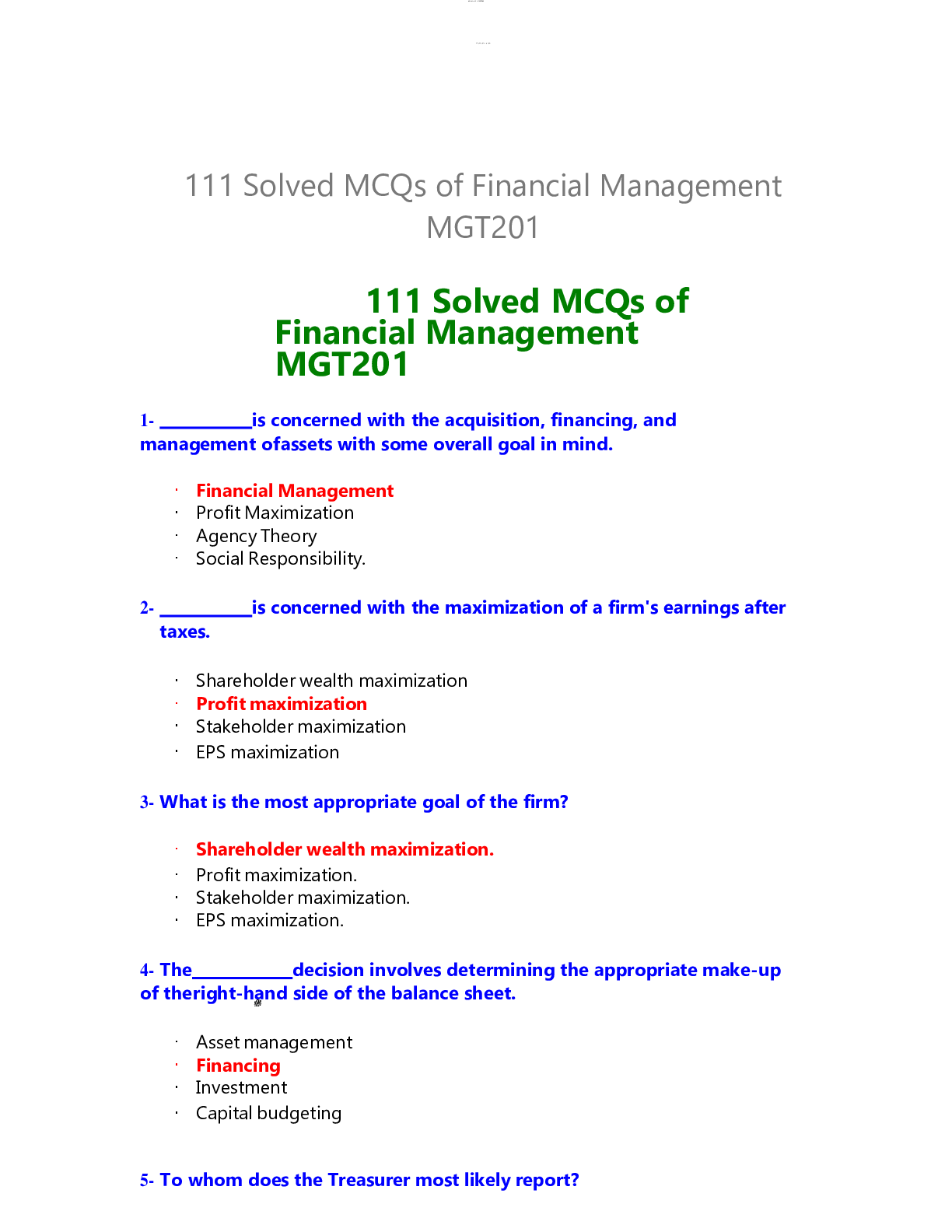
Reviews( 0 )
Document information
Connected school, study & course
About the document
Uploaded On
Jan 27, 2022
Number of pages
29
Written in
Additional information
This document has been written for:
Uploaded
Jan 27, 2022
Downloads
0
Views
48


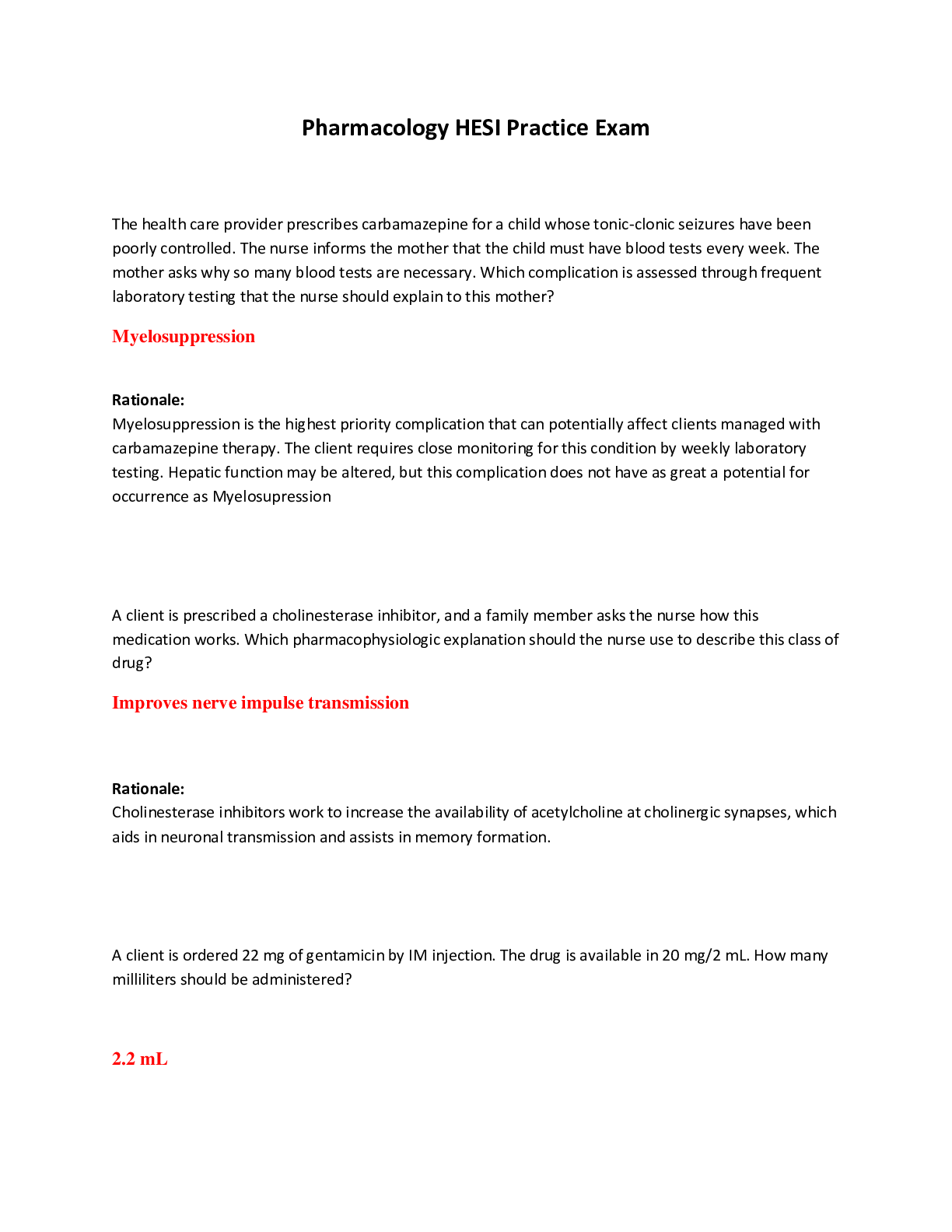
.png)
